#Prophetic Black Revelations
Explore tagged Tumblr posts
Text
My article on Doctrine and Covenants 116 (RLDS), why it should remain as scripture...
(...and white paternalism in the church.)
I never posted this here because I don't know any Community of Christ saints on tumblr (shout out to tumblrstake saints for letting me hang out with them) Please read if interested in RLDS/CofC D&C scriptures and how we can do wild things like remove scripture via common consent. Or if you are interested in an issue that affects/affected Black Saints in Community of Christ. Esp in the United States church w/ Black american Saints.
TL;DR at the bottom
I wrote an article on Doctrine and Covenants section 116 and published it on medium. I also sent some copies out to church friends in historical societies. This was winter/spring 2023. (i later found out it made it's way to the First Presidency bc the Counselor to the President reached out about it. ) D&C 116, in part, pertains to the ordination of men of color, with a heavy focus on Black men. The revelation the Prophet Joseph Smith III received from God is that it is God's will that men of all races be ordained. It was adopted into the Doctrine and Covenants in 1865. It also has less savory parts that were used to justify segregation. When I asked those who wanted it out felt that it could lead people away/astray. They focus in on their, not unbased, conclusion that the revelation stated segregation is God's will, and therefore is false. All of the person's who spoke against it in my life were white reorganized saints. I decided to ask my Black brothers and sisters in Community of Christ. Many who experienced the church during the era of segregation. And, as I had a suspicion, none of them/us wanted it removed and were against the measure. Some felt it wasn't appropiate to weigh in due to position. Some didn't like it but didn't want to lead a charge on it. Some were quite vocal and gave presentations to the unofficial latter day saint groups. Some heard of my work (a newbie convert. pre-baptism for part of it. that's while I'm still shocked), and tracked me down, to talk about the matter. Generations of Black reorganized saints who all, for different yet overlapping reasons, wanted it to remain. Many let me listen to them and publish quotes. In the united states, Community of Christ is majority white. I think this is the case for most Latter Day Saint churches. It is quite possible that the stake/mission center that presented this resolution to the Conference didn't have Black members involved. I hazard that this is the case. Coming mostly from a good place but also unintentionally condescending or harmful. So I had to do something about it. obviously.
I went to an Apostle's presentation on Prophet-President JSIII and D&C 116 and was like "can I help you with more work on this topic?" and he was like "no, but i can help you?" he gave me his short powerpoint presentation, recommended me a few books, and I got to work. https://medium.com/@wednesdayrjones/doctrine-and-covenants-116-is-significant-scripture-and-scripture-is-what-it-should-remain-11bbcee561c3 My personal experience with the section when I first read it was evidence of the prophetic nature of the church. I was happy to see D&C 116 because it was a step in the right direction. A big one. Similar verbiage can be found in the revelation on Women in the Priesthood. God tells us, and we acknowledge in the Doctrine and and Covenants, that the misuse of scripture too often harms marginalized people and the Church is called to repent of such practices. that's continuing revelation, sis/bro/sib
The 1st Prophet of the Reorganization, Joseph Smith III, earned my respect in part by engaging with him through this text. And those early Black saints, whose' testimonies' i read and hold dearly, certainly have my respect and my adoration. i hope to embody the hope for Zion and activeness in bringing God's kingdom forth that they had.
we (me and other Black saints involved and our allies) were successful btw. the resolution went up to the first presidency for them to decide, as it wasn't decided on at the World Conference by common consent due to time restraints (I did have a few delegates promise to read parts of my article during their time in the discussion period). The First Presidency made no moves to remove it and i am glad to have had a part in that.
TL;DR here is an article i wrote about Doctrine and Covenants 116 - Race in the Priesthood in Community of Chirst/RLDS. It was up for removal and now it's not. Much due to the work of Black saints, including myself, those I interviewed, and others I was blessed to interact with. let me know what you think or if you have any questions about it or Prophet-President Joseph Smith III or his politics on race and abolition as well has his father's (from his presidential platform. Prophet-President Joseph Smith Jr. The 1st prophet of the Restoration.), or books recommendations or my beliefs surrounding this scripture, the Doctrine and Covenants as a whole, modern day prophets and prophecy and Continuing revelation etc. Or for my fellow saints, this sounds similar or bizzare? and do you have any questions about things like World Conference or how common consent is used within CofC? Any comments regarding OD2 and similarities / differences? I love to talk about history, esp where it ties with my faith. and it brings to mind, what does it mean for scripture to be Inspired.
or let me know if this inspires you to take on a sort of project, church or otherwise. Learning the D&C in depth requires knowledge of the the state of the church and historical context in which the prophet is seeking answers for is so fascinating.
#tumblrstake#latter day saints#queerstake#mormon history#black mormon history#latter day saint history#Black history#Community of Christ#the Reorganized Church of Jesus Christ of Latter Day Saints#before all is said and done...i'm gonna be Black mormon history /srs#Muslims really won with the (PBUH)#bc typing out 'Prophet-President' is annoying af. respectfully#but i'm tryna be respectful so Prophet President First Name - Middle Initial - Last Name is what it is at first#then all initials the prophet/president/prophet-president JSjr JSIII FMS IAS WWS WBS GLM SMV soon to be SDC. and i did that all from memory#idk if queerstake is appropriate use of tag but i am a queer person engaging with church work on a pervasive level so i decided to use it#it did affect how i maneuvered in spaces in a way that sucks like being around your (Black) people but not being “overly/overtly” homosexua#no cap /hj throw away the book of revelations b4 this section imo#no cap: revelations is a powerful book one can use to talk real about imperialism but i didn't encounter that until my latter day conversio#so not a common take (from my limited world view)
2 notes
·
View notes
Text
#spinetical#righteous wisdom#black wisdom#original freehand wisdom#Lanor Ashley Hughes#prayers and blessings#god concept art#universal universe art#prophetic revelation#all art#human ai art
0 notes
Text
The Advantage Of Dream Work

Dream work, offers a unique opportunity for magical exploration and personal growth. After all, we do spend up to 25% of our lives dreaming. This alternate reality is a haven for shadow work and magickal practice. By combining ancient techniques and modern understanding of consciousness, you can unlock the potential of your dreamscape.
Understanding the Dream Realm
In witchcraft, dreams are seen as a bridge between the waking and spiritual worlds. They offer glimpses into the subconscious mind, where powerful energies reside.
There are a couple things you can do daily to increase your dream lucidity. Write down your dreams upon waking, no matter how fragmented. Keeping a dream journal enhances dream recall and help you identify recurring symbols and themes. Reality checks are also a practice you should adopt. Pinch your skin, try to read text, check the time, or look at your hands. This trains your mind to question reality, making it easier to recognize dream states.
Techniques for Lucid Dreaming
• Mnemonic Induction of Lucid Dreams (MILD): Before sleep, visualize yourself performing a reality check in a dream. Repeat this intention until you fall asleep.
• Wake Back to Bed (WBTB): Wake up after a few hours of sleep, stay awake for 20-30 minutes, then return to bed. This increases the likelihood of entering a lucid dream state.
• Dream Incubation: Set an intention before sleep, focusing on what you wish to experience or learn in your dream. This can be as simple as "I will have a lucid dream tonight" or a more specific goal.
Prophetic Dreaming
Prophetic dreaming is a potent tool for divination and foresight. These dreams, often vivid and symbolic, offer glimpses into future events or hidden truths. By interpreting the dream's imagery and symbolism, you can gain valuable insights and prepare for what lies ahead. These dreams can range from personal revelations to broader societal trends. To enhance prophetic dreaming, practitioners often employ various techniques, such as dream journaling, meditation, and the use of specific herbs and crystals. By attuning to the subtle energies of the dream realm, witches can unlock the secrets of the future and navigate life with greater wisdom and purpose.
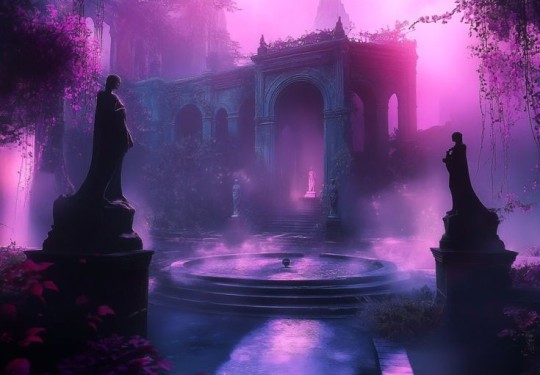
Dream-Walking
Dream-walking is another form of dream work where the dreamer, in a state of lucidity, travels outside their own dreamscape. These journeys can lead them to astral projection, dream-hopping (visiting the dreams of others), travel to the spiritual realms, or even the land of the dead. Dream-walking carries many risks and proper precautions should be taken before even attempting it.
While dream-walking can be learned, it often comes naturally to those who practice it. Techniques are different for each person but it is something akin to hedge-riding, except the other world is accessed in a sleep state. While dangerous, it is an easier (for some) way to access other realms and even the minds of others.
Magical Enhancements
• Herbs: Blue lotus, mugwort, lavender, valerian, dream herb, passion flower, anise, rosemary, devil's claw, lemon balm, wormwood, chamomile, catnip, yarrow, skullcap, damiana, sage, angelica, calamus, tulsi, bay, ashwagandha, jasmine, mullien, cat's claw, jasmine, eye bright, calendula
• Crystals: Labradorite, moonstone, moldavite, amethyst, apatite, hematite, herkimer diamond, lapis lazuli, smokey/black quartz, covellite, charoite, scolecite, epidote, blue goldstone, celestite, fluorite, rainbow obsidian, blue tiger's eye, danburite, iolite, azurite, sodalite, blue kyanite, blue calcite, selenite
• Dream magick: Dream pillows, spell bags/jars, enchanted jewelry, sigils, bath rituals, lunar work, candle spells, incantations, teas

Exploring the Dreamscape
Once you've achieved lucidity, the possibilities are endless. Shadow work, spellcasting, healing, manifestation, spirit communication, baneful magick, necromancy, astral projection, astral creation, and hedge-riding are all easier to do here. Through practice you can learn to access your own astral realm as well as your astral and spiritual bodies. This can give you amazing control and insight in your waking life.
Safety and Ethics
Grounding is essential. Before falling asleep and after waking from a lucid dream or dream journey, ground yourself by connecting with your physical body and surroundings. Consider the whole impact before violating someone's mind or dreamscape/subconscious. Your dreams affect your daily experiences more than most know. Approach dream work with a sense of curiosity and reverence. Remember, lucid dreaming is a skill that takes practice. Be patient with yourself and enjoy the journey of exploring your subconscious mind and beyond.
Common Dream Symbols
Remember, dream interpretation is highly personal. These are general interpretations and may vary based on individual experiences and cultural context. It's often helpful to consider the specific emotions and sensations associated with the dream.

Animals
• Snake: Transformation, healing, sexuality, or hidden fears
• Spider: Creativity, patience, and problem-solving
• Dog: Loyalty, friendship, and protection
• Cat: Independence, intuition, and mystery
• Owl: Wisdom, knowledge, and intuition
• Horse: Power, freedom, and sexuality
• Deer: Sensitivity, gentleness, and intuition
• Bear: Strength, protection, and grounding
• Lion: Power, courage, and leadership
• Wolf: Leadership, family, and persistence
Natural Elements
• Water: Emotions, subconscious, and the flow of life
• Fire: Passion, anger, transformation, and purification
• Earth: Grounding, stability, and physical body
• Air: Intellect, communication, and spiritual connection
Objects and Places
• Teeth: Anxiety, insecurity, or feeling powerless.
• House: Self, family, or emotional state.
• School: Learning, growth, or feeling inadequate.
• Hospital: Illness, fear, or need for healing.
• Flying: Freedom, ambition, or spiritual awakening.
• Falling: Loss of control, fear, or insecurity.
• Keys: Access, opportunity, or unlocking potential.
• Doors: New beginnings, opportunities, or obstacles.
• Bridges: Transition, change, or connecting different aspects of oneself.
Other Symbols
• Death: Change, transformation, or the end of a cycle.
• Pregnancy: Creativity, new beginnings, or potential.
• Nakedness: Vulnerability, shame, or a desire for authenticity.
• Being chased: Fear, anxiety, or avoidance of something.
• Being lost: Confusion, uncertainty, or feeling overwhelmed.
• Being late: Fear of missing out, procrastination, or time management issues.
• Being stuck: Feeling trapped, helpless, or unable to move forward.
To delve deeper into dream interpretation, consider keeping a dream journal, exploring your personal associations with symbology, and always consider the emotional tone of the dream.
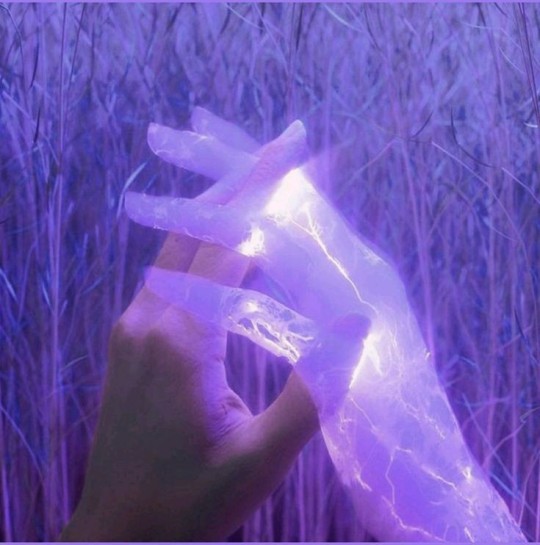
#witch#witchcraft#witchblr#witch community#lucid dreaming#Dream work#spirit work#spellwork#spellcasting#spell#shadowwork#shadow#astral projection#hedgewitch#divination#prophecy#eclectic#magick#demonolatry#lefthandpath#Pagan#dark#satanic witch
122 notes
·
View notes
Text
The Beast & The Church in 'Black Death Rising'
I'm writing a religious horror rpg, in which the End Of Days is in full swing in 15th century Europe. I figured it'd be worth it to talk about that game's religious perspective.
So I'm going to do something inadvisable, and talk about religion from a christian perspective. (religious/setting design ramblings under the cut)
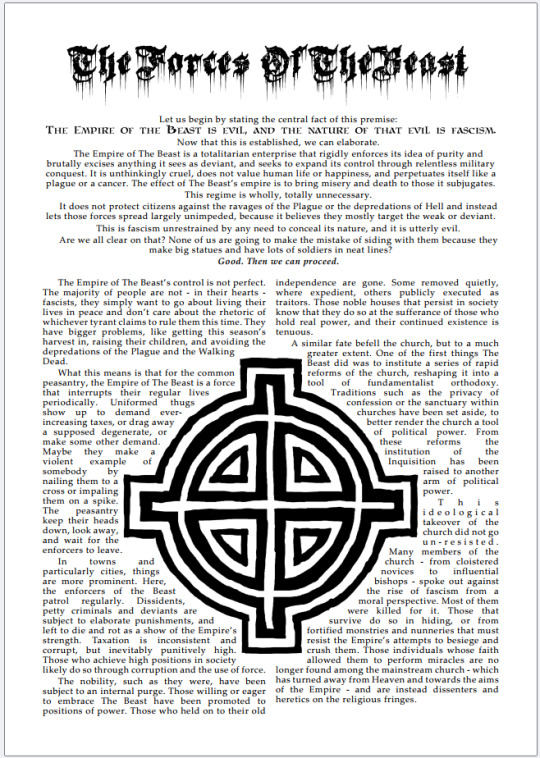
Some context. I'm a quaker; for those less invested in minor christian dissenter sects, I'll give a brief summary. Quakers are a sect going back to the 17th century, with a strong focus on egaletarianism and individual conscience. No clergy or heirarchy, no formalised doctrines, and - historically and currently - a lot of focus on social justice issues. Honesty, equality, pacifism and simplicity as core value. So that's the overview.
This is, you will note, a stark contrast to a lot of what Christianity is currently, and has historically been. Which is to say, quite often on the side of the wealthy, the societally entrenched, and the oppressive.
I am also, as it happens, very openly and obviously queer. As you can imagine, this makes me really quite uncomfortable in a lot of 'christian spaces'.
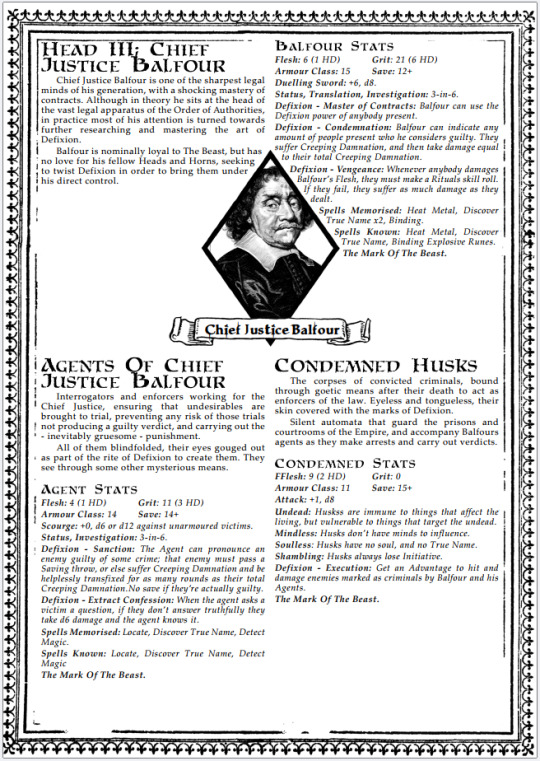
So. Let's turn our attention to the Book of Revelations, as the various ideas in there are a lot of the game's inspiration. Revelations is written extremely abstractly, with dense metaphorical language rather than a direct accounting of events. There are, needless to say, a wide variety of ways to interpret the text, but I will focus on my own.
A key feature of Revelations is the subversion of religion; the idea of a false prophet turning religion away from its moral/spiritual purpose, and making it a tool for politics, leading to the rise of 'the beast' to power. It's made clear that as the beast seizes power, it goes on to use that power to persecute the outgroup (with whom the text's sympathies lie) and that a church controlled by and reverent of the beast becomes evil and totalitarian, leading to widespread suffering.
The parallels to the state of christianity in the modern day are, to my mind, quite apt. A wide faction - 'conservative christianity' to be polite about it, or christian nationalism to be more blunt - aligns itself with the oppresser over the oppressed, concerns itself with worldly wealth and power, and is actively and openly and inexorably tied to dangerous political forces. That mainstream christianity frequently acts in support of fascism is hard to miss.

There is a particular horror, I think, to seeing representations of one's faith hollowed out and distorted, emptied of their spiritual value and instead becoming a tool for evil. The perversion of what should be sacred has a huge potential for horror.
This is, after all, a particular horror one encounters in a regular basis in the real world. I mean, fuck, one simply needs to see Kenneth Copeland speak for 30 seconds to get a sense of something deeply, deeply wrong.
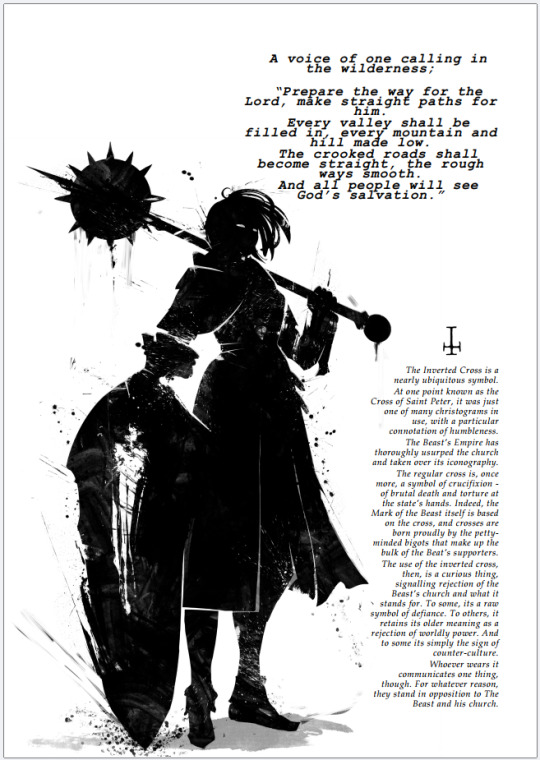
So, this is the horror the game seeks to capture and accentuate. The sense of what should be holy having been emptied out and used for evil. The twisting of faith to become a tool for fascism.
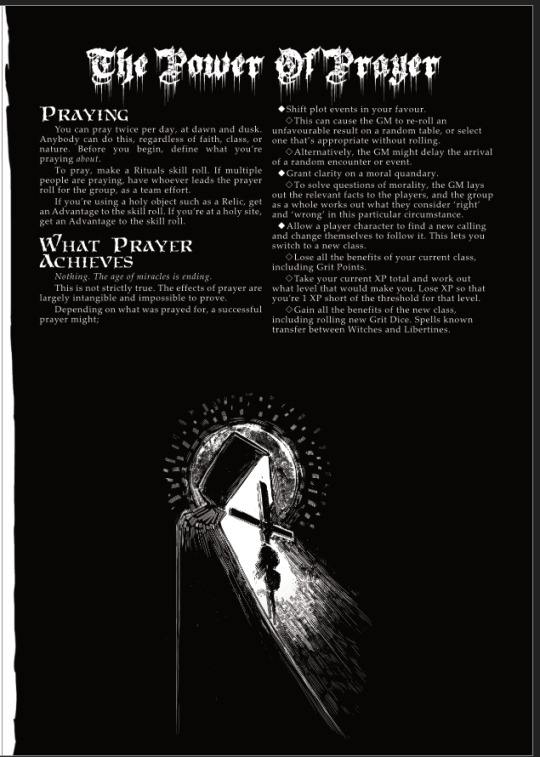
To this end, the game treats aspects of Revelations quite literally. The Beast is, in fact, the leader of a vast and horrible fascist empire that is the cause of misery on a vast scale. Key to this is the total cooption of the church. The 'pope' is a reanimated corpse issueing proclamations at the Beast's direction, and the church is an engine of propaganda and inquisition that serves to enforce the empire's orthodoxy and stoke hatred against the Empire's outgroups.
This is not to say that faith is absent, but those possessing true spiritual conviction (and with it, in some cases, the ability to perform miracles) are definitively outside the church; actual faith is the domain of religious dissenters and heretics. PC clerics are not members of the church, they're actively persecuted by that church for - essentially - their refusal to spiritually sell out.
(Also, critically, miracles are not the sole domain of christianity; the game treats Jewish and Muslim figures as equally capable of performing miracles, and grants relics associated with those religions equal potency to christian ones; what matters is spiritual conviction, not one's specific denomination).
Other aspects of The Beast's Empire followed from this. Inquisitors and paramilitary agents are common enemies, and the 'seven heads and ten horns' are taken to represent The Beasts inner circle of most powerful servants.
In particular, I've given the Beast's empire it's own form of magic, Defixion, with the name taken from old roman curse-tablets. Defixion is, essentially, the magic of spiritually selling out. In exchange for eroding the user's soul, they become bound to The Beast and his empire; this gives him incredible power over them, but also grants them power based on their position within the Empire's heirarchy. Importantly, it's totally, one-hundred-percent off limits to player characters; playing as the fascists simply exists outside the scope of the game. Instead, Defixion is an explanation for why the Empire's agents have scary monster stat-blocks.
The choice of what to make The Mark Of The Beast was surprisingly easy; it's a cross, the same one that is embraced by fascist groups such as Stormfront.
(This also ties in with the use of the inverted cross as a counter-cultural icon; it's historically been a symbol of humility before God, and in the modern age is associated with strongly anti-church sentiments. In a setting where the church has turned away from God and towards hateful political power, those two meanings can go hand in hand.)
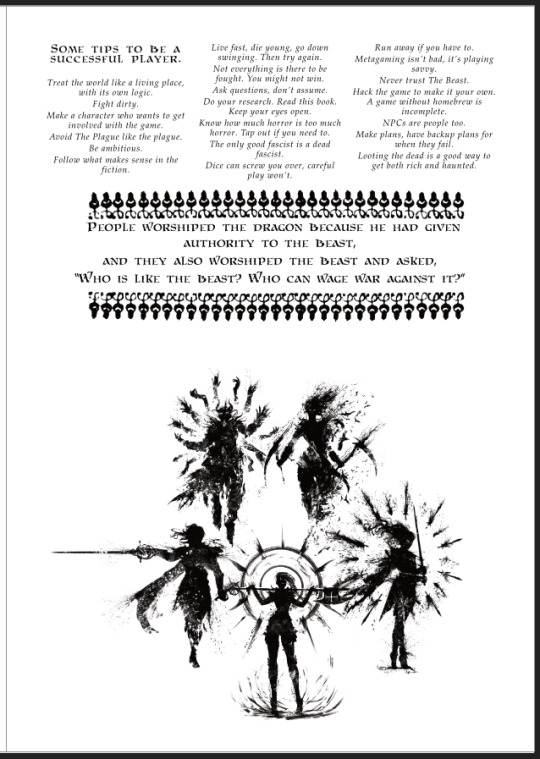
In conclusion: "I know writers who use subtext, and they're all cowards."
82 notes
·
View notes
Text
Small trigger warning for Reg getting ripped apart.
The Potter's wedding is beautiful. Small, but beautiful and warm. With very few people in attendance, not that it mattered much. James and Lily were married and that was all that mattered to Sirius.
Regulus Black came to a terrifying revelation.
He offered his congratulations to the couple but as he hugged James. He was overcome with a feeling of dread. Like something was wrong. Sirius forced it down. He couldn't be feeling like this at his best friend's wedding.
The place is cold, not that Regulus could actually tell, he just assumed that everything was cold now. The note is in his hand.
Lily and James dance along to ABBA's Dancing Queen and Sirius thinks they are made for each other. It's one of the few small moments of happiness in the war. He wants to preserve it in his memory. Keep it close to his heart forever.
His smile falters when he doesn't see the mess of dark brown curls and red hair. He sees black curls and finds himself unwillingly wondering if Regulus will ever get married.
He hopes Evan and Barty will forgive him.
It's a silly thought. Regulus would probably just marry whoever keeps the line pure. Just the way their parents always wanted. He takes a swig of his glass. Regulus deserved to marry someone he liked.
He needs to stop thinking about him. But the feeling of dread isn't going away. It's bothering him. His stomach hurts. He needs to sit down because there is something wrong and he doesn't know what it is and it's ruining the wedding reception.
The drink burns his throat. He forces himself to continue drinking.
The champagne isn't helping but Sirius forces himself to take another sip.
The nails scratched against his skin. Pulling and pulling. He just wants water. He just wants to get away. He just wants Sirius. Everything hurts.
Sirius wants to cry so he excuses himself for a moment. James and Remus look concerned and Lily tries to ask if everything is alright before he rushes out.
He can't hear anything beyond screaming. It's probably his. The inferni are ruthless. Grabbing what they can. His arms, his shirt, his hair, his neck, his legs. Whatever they can get. Regulus can feel their nails dig into his skin, piercing it. Water overtakes his lungs at the same time he feels the shared pain of his back being torn and his arm being bitten and torn off. He can't scream. He can't move. Buried under the mounds of undead tearing him apart until he saw black.
When Sirius looks up, he can't see Regulus in the sky anymore and he doesn't read the prophet the next morning because he knows his brother is dead just shy before 18 years old.
He can only cry.
#sirius black#marauders era#regulus arcturus black#sirius orion black#regulus black#the black brothers#regulus and sirius#sirius and regulus#black brothers angst#angst#first wizarding war
109 notes
·
View notes
Text
Severitus.
Think with me, Petunia only met James once, and she was trying to forget the memory more and more. Dumbledore, McGonagall and Hagrid had only seen Harry as a baby.
I need a fanfiction where Hagrid comes pick Harry up, takes a look at the boy and goes: "This is not James' son."
Black greasy hair, pale skin, big nose.
The was no deniability, the kid looked exactly like a mini Professor Snape, unless, of course, for the famous scar and the eyes — ah, Lily's eyes! Would it be true? Lily Potter was a cheater?!
I doubt that Petunia would even remember that one neighbor she had as a child, who spent most of the year away, that was just as freaky as the sister she was trying to forget and who she hadn't seen in more than a decade, let anole realize that the kid, who she rather pretend didn't exist, looked like him.
//
Snape had alittle petty smile on the lips, realizing that James Potter had sacrificed his little life to save not only a baby that wasn't his, but no other than Severus —no, Snivellus' son.
At same time, somewhere in the other side, James was smiling too, when Snivellus' son got sorted into Gryffindor, basically begging to not go to his father's beloved Slytherin.
//
Rita Skeeter was reveling with the news. The Daily Prophet's machetes spent weeks looking like:
"Young Savior Harry Potter enters Hogwarts with Shocking Scandal!"
"The myth of purity of Lily and James Potter: AFFAIR?!"
"Harry Potter isn't a Potter at all!"
"The Boy Who Lived and the MOTHER WHO CHEATED?!"
#severus snape#pro snape#anti marauders#character analysis#harry potter & severus snape#anti james potter#severitus#Lily cheated on James#rubeus hagrid#Philosopher stone#harry potter#harry potter fanfiction#Harry Potter and the Sorcerer's stone#sorcerer's stone#Harry Potter and the Philosopher Stone#Snape is Harry's father#snilly#lily evans potter#james potter#petunia dursley#petunia evans#Snape is Harry's parent#rita skeeter#daily prophet
84 notes
·
View notes
Text
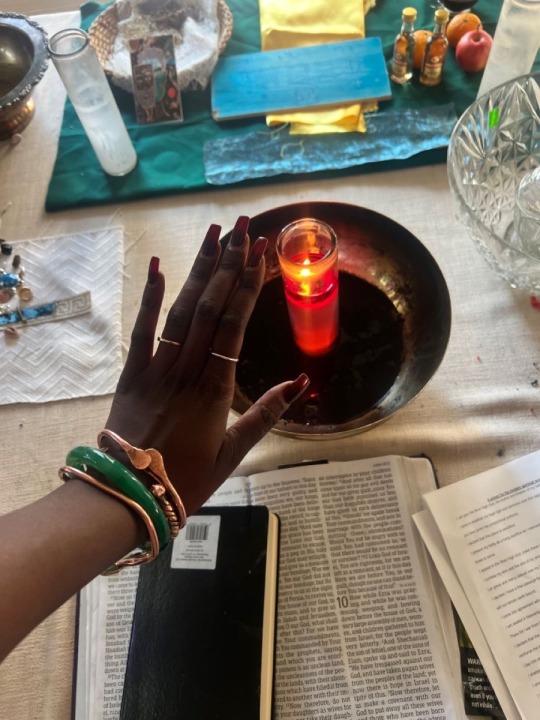
Prophecy and Mediumship in Hoodoo
♠️♦️♠️♦️♠️♦️♠️♦️♠️
Hoodoo, born in the Americas through the experiences of Black Americans, holds diverse meanings for different practitioners—some see it as a spiritual system, others as a way of life, and some, like myself, view it as a religion. Within the depths of hoodoo, there exists a myriad of practices, all stemming from the spiritual beliefs inherited from our ancestors, albeit tempered by the harsh realities of slavery.
A distinct spiritual trait that resonates strongly within the Black community is our innate ability to heal and see, particularly in the context of prophecy. Prophecy, often associated with characters in Christian philosophy acting out divine will, extends beyond religious boundaries. Prophets, far from being relics of ancient religions, exist in the present day. Whether you explore Black religions, spiritual systems, or those influenced by Black spirituality such as Islam and Christianity, you'll find an abundance of seers—individuals capable of sharing insights gained through spirit, dreams, or visions.
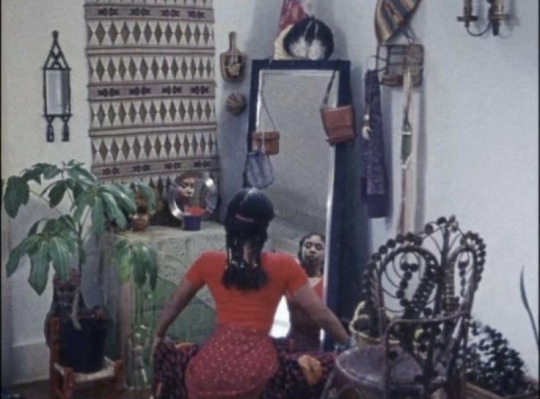
Traditional hoodoo, predating modern divination tools like cartomancy, dice, dominoes, and tarot, relied heavily on dreams and visions. Our elders would nap in prayer and awaken with revelations—a form of Black American divination. Every cultural spiritual system has its unique form of divination, and for us, it encompasses dreams, prayers, visions, and even casual conversations.
Have you ever been engaged in conversation and pieced together information seemingly from nowhere? Or encountered an elderly Black woman who warned you about potential troubles? This, too, is prophecy—an integral part of our cultural heritage.
Mediumship plays a pivotal role in hoodoo, with practitioners thriving on ancestral veneration to uplift and work with the spirits of the dead. As one progresses from a novice to a hoodoo conjurer, channels open to allow contact with spirits. Practices such as graveyard walks, visits to crossroads or forests are acts of mediumship, as conjurers commune with the spirits residing there.
In hoodoo, many of our spirits were once living, and they yearn to collaborate with us. Engaging in rituals at these sacred sites not only uplifts our spirits but also allows them to guide and support us. Authentic hoodoo practice opens channels and leads to a form of self-initiation. As you delve deeper into your journey, gifts you never knew you possessed may surface, often traced back to a specific ancestor in your family.
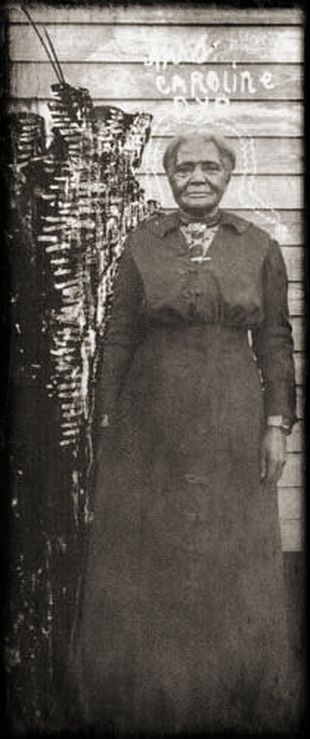
Genealogy, an essential aspect of our mediumship, unfolds through ancestral veneration. As you honor your ancestors, they guide you to where you need to be. Mediumship in hoodoo is not a hurried process; it's a journey of self-discovery and healing. Eventually, you may find yourself interceding for others, but first, there's a personal healing and transformation that awaits each practitioner.
prophecy and mediumship serves as a profound tool for both personal healing and acting as intermediaries for others. Those seasoned in the craft, having traversed the intricacies of life, acquire the ability to peer beyond the veil. In my understanding and based on research, it's evident that spiritual gifts are inherently woven into the fabric of most, if not all, Black Americans. Many, unknowingly, harness these gifts in their daily lives. However, for those consciously developing and nurturing these aspects, spiritual and tangible rewards unfold.
As a prophetic medium, my daily routine involves moments of meditation, reading, and yes, even napping—I have the privilege of being a stay-at-home wife, after all. During the rhythm of my household chores, I engage in the act of conjuring spirits, invoking protection, healing, and love, while simultaneously binding spirits that may pose a threat. This deliberate practice is an embodiment of mediumship.
Hoodoo, in essence, is an intricate tapestry of mediumship and prophecy. It transcends the conventional notions of a spiritual system, demanding more than the mere arrangement of altars and the creation of honey jars. Hoodoo necessitates an inward journey—an exploration of self that goes beyond the surface. At its core, there is no hoodoo without acknowledging and venerating the ancestors. In the practice of hoodoo, progression is contingent upon a profound acknowledgment of one's lineage.
For Black Americans, this work is not just a choice; it's a necessity. Generations of healing beckon us, stemming from the profound scars of slavery and other malicious acts directed towards our community. The true essence of hoodoo lies in the depth of this self-awareness and the unwavering commitment to healing the wounds passed down through generations. As we engage in this work, we embark on a transformative journey that not only heals the individual but also contributes to the collective healing of our people.
Follow my social media Below for more interesting Hoodoo and esoteric facts, courses, and services!
@conjuhwoeman on twitter for my daily thoughts and downloads
@realconjuhwoeman on Instagram for photos
@mymindandmeinc on Instagram for my 501c3
@realconjuhwoeman on youtube for those of you who are visual learners!
Be sure to support My Mind and Me inc and Temple of Living Word LLC project The Peoples Praise House where we are raising a Building Fund for our home fot ATR practitioners to practice freely!
68 notes
·
View notes
Text
Hellhounds on His Trail: E L U C I D's REVELATOR

I speak what I see.
—Saul Williams, “Elohim (1972)” (1998)
I say that one must be a seer, make oneself a seer. The poet makes himself a seer by a long, prodigious, and systematic derangement of all the senses.
—Arthur Rimbaud, “Letters of the Seer” (1871)
Every technological change begins with a spiritual revelation.
—Nathaniel Mackey (2016)
1. LASCIATE OGNI SPERANZA, VOI CH’ENTRATE
The same motherfucker got us living in his hell.
—Chuck D, Public Enemy’s “Black Steel in the Hour of Chaos” (1988)
I must forewarn you even now: what I intend to speak about, and in which I shall get myself entangled for reasons more serious than my incompetence, they are, I believe, without solution or exit. Two years ago, ELUCID promised that I Told Bessie could be significantly darker: “Trust me, it could be way more apocalyptic.” REVELATOR fulfills that promise. I Told Bessie introduced ELUCID as an anti-mystic mystic; on REVELATOR, we find him between the forge and the flame. He speaks from filthy tongue of god and griot, offering a <brand> of spiritual healing in the same <vein> as Dälek’s “Spiritual Healing” [for brand read “fire,” “cauterize,” “marked ownership”; for vein read “cold,” “spike,” “artery”]. At turns, his speech sounds of languages diverse, horrible dialects, accents of anger, words of agony, and voices high and hoarse. On ITB, ELUCID had just arrived in Heaven, trespassed its gates, yet stubbornly refused to sit down, to repose. On REVELATOR, he’s at Hell’s wrought-iron threshold, absolutely ruptured.
ELUCID emerges as a transgressive and dark magus speaking the omniversal language of Sun Ra. The first words spoken on REVELATOR, evidently ad-libbed, recall both Fritz Lang’s expressionistic Tower of Babel and Mister X’s psychitecture: “Metropolis…inverse overlord skyscape…” Another filmic nod would be to PTA’s There Will Be Blood (2017), where the climactic and classical rage of Daniel Plainview is unleashed as he screams: I am the Third Revelation! Plainview is, as his name intimates, an unbeliever, and he masterfully coerces preacher Eli Sunday into stating he’s a false prophet and that God is a superstition.
See, the First Revelation was in the Old Testament (Show me your commaaaandments, as ELUCID drones on “Barbarians”); the Second Revelation was Jesus sermonizing that new shit; why mightn’t it be that the Holy Spirit was preparing another? ELUCID delivers the Third Revelation; he is the Seer, the Revelator—entering through a hatch [re: portal] of Houston horrorcore and disharmonic hard bop. REVELATOR is his unexpurgated rendition of K-Rino’s Stories from the Black Book (1993). The mutant blues of ITB have turned to hypnotik hip-noize—serrated, jaggy, shrapKnel-shattered, caltrop-piercéd. We witness, firsthand, the doom gospel he has previously preached about in practice, in praxis, in the demoniac rhythms and the patterns. Ganksta N-I-P’s “Reporter From Hell” (1993) amalgamated with Rimbaud’s A Season in Hell (1873).
2. NOISOME THE EARTH IS
“Here in this hymn-deaf hell,” Rimbaud reports back, but in ELUCID’s hell all we hear are hymns—shrieks, semiwept, semisung. “A black wail is a killer,” Tracie Morris, Harryette Mullen, Jo Stewart, and Yolanda Wisher write in “4 Telling” (2021), a posse-cut poem. Production of “a satanic symphony,” Rimbaud says. Sounding like EPMD in the pulpit, Rimbaud claims “[t]heology is serious business: hell is absolutely down below.” He describes moonlight when the clock strikes twelve, “the hour when the devil waits at the belfry.” Go get a late pass, in other words, as PE presses on “Countdown to Armageddon” (1988) and ELUCID reiterates on “MBTTS” (2016). “Watch me tear a few terrible leaves from my book of the damned,” Rimbaud writes, appealing to the Devil, “...I will unveil every mystery.”
ELUCID unveils histories of mysteries during his descent. On record, he shares what he sees. He sees Rimbaud in Hell. He sees Kanye and JPEGMafia in hell, Ye with BURZUM in Gothic script emblazoned across his chest. He sees Rubble Kings with SS skulls and sigs sewn onto Flyin’ Cut Sleeves denim. He sees Black Benjie’s assassin in Hell. He sees Richard Hell in hell holding White Noise Supremacists to account for how they treated Ivan Julian (“Mutants can learn to hate each other and have prejudices too,” the latter told Lester Bangs). He says peace to SKECH185 and sees him “playing devil’s advocate with Steve Albini’s Black friend.” Finally, he sees the cerberus in hell—the “monster cruel and uncouth,” according to Dante (c. 1321)—the 3-headed anti-crowd dog. He sees its three gullets, red eyes, and unctuous beard and black and belly large. He sees the wretched reprobates. He sees muzzles filth-begrimed. He sees hellhounds here, there, and everywhere.
3. ROUND US BARK THE MAD AND HUNGRY DOGS
From forth the kennel of thy womb hath crept A hellhound that doth hunt us all to death—
—Shakespeare, Richard III, 4.4.49-50 (c. 1592-1594)
“Hands off,” ELUCID commands on “THE WORLD IS DOG,” the opening salvo on REVELATOR [salvo, a discharge of weaponry; yet also salivate: dog’s drool, secretion, spittle, spit the verse]. “It’s just happening,” he shouts—it’s happening to us; we are subjects of history, its malevolent thrum. “I can feel it ’fore you say it,” and I’ve no reason to doubt him. But allow me to litanize anyway.
In Afro-Dog: Blackness and the Animal Question (2018), Bénédicte Boisseron writes that the dog, the canis familiaris, is “an unwilling participant in the history of social injustice,” a casualty to a depraved Pavlovian conditioning. She cites an “association between canine aggression and black civil disobedience,” reflecting a “prism in which race and dogs insidiously intersect in tales of violence.” She refers to these as cyno-racial (dog-black) representations.

Bloodhounds—aptly-named barking, beastly embodiments of biopower—were “imported from Cuba or Germany” during slavery and “trained to pursue escaping slaves in both the Caribbean and the American South,” Boisseron writes. Dogs were designed to “become ferocious only when in contact with blacks.” The Narrative of James Williams, an American Slave, Who Was for Several Years a Driver on a Cotton Plantation in Alabama (1838) provides insight into this odious operation:
A negro is directed to go into the woods and secure himself upon a tree. When sufficient time has elapsed for doing this, the hound is put upon his track. The blacks are compelled to worry them until they make them their implacable enemies; and it is common to meet with dogs which will take no notice of whites, though entire strangers, but will suffer no blacks.
The Narrative of the Life and Adventures of Henry Bibb, an American Slave, Written by Himself (1849), meanwhile, offers a suspenseful, first-person account:
We had been wandering about through the cane brakes, bushes, and briers, for several days, when we heard the yelping of blood hounds, a great way off, but they seemed to come nearer and nearer to us. We thought after awhile that they must be on our track; we listened attentively at the approach. We knew it was no use for us to undertake to escape from them, and as they drew nigh, we heard the voice of a man hissing on the dogs.… The shrill yelling of the savage blood hounds as they drew nigh made the woods echo.
The training, of course, isn’t only about ghoulish intimidation; the hunt would often climax with violence. “When the slave runs away,” Boisseron explains, “the master needs to symbolically reassert his domination through a ritualized act of flesh cutting.” [FANG BITE!] Frederick Douglass spoke of such savagery: “Sometimes in hunting negroes…the slaves are torn to pieces.” Mutilation of runaway slaves, Boisseron claims, enacted “a rhetoric of edibility.” Derrida called it carno-phallogocentrism, linking the slavehunter’s virility and carnivorism, savoring “deeper shades of carnage,” as ELUCID says on “ZIGZAGZIG.” It has never relented. In the wake of Michael Brown’s murder in 2014, the DOJ issued a report that detailed “puncture wounds” left in children by the Ferguson K-9 unit. The victims of these “bite incident[s]” were always Black.
ELUCID also speaks of how victims “force-feed a war machine” on “ZIGZAGZIG”—regions and relics swallowed whole, irrevocably. In their plateau “Becoming-Intense, Becoming-Animal, Becoming-Imperceptible…” (1980), Deleuze and Guattari write: “You become animal only molecularly. You do not become a barking molar dog, but by barking, if it is done with enough feeling, with enough necessity and composition, you emit a molecular dog.” Somewhere on a desolate Yonkers street corner, DMX sleeps with a pack of strays, lying in wait.

4.
Police forces…have used dogs to break up rioting mobs…. The dogs’ snapping teeth, swift movements and indifference to the crowds’ menacing threats have made mob control a routine procedure for the forces which have the dogs.
—“A Progress Report of the Assembly Interim Committee on Governmental Efficiency and Economy on Using Dogs in Police Work, California” (1960)
If a dog is biting a black man, the black man should kill the dog, whether the dog is a police dog or a hound dog or any kind of dog… [T]hat black man should kill that dog or any two-legged dog who sicks the dog on him.
—Malcolm X (1963)
In a contemptible case of cultural exchange, two German shepherds trained by a Nazi stormtrooper were used by police in Jackson, Mississippi to attack crowds in support of the Tougaloo Nine—Black students attempting to access books from a whites-only public library. That was in 1961. [TRUST NONE!] Two years later, Bull Connor utilized dogs to disperse protestors in Birmingham, notoriously documented by Charles Moore and Bill Hudson. Hudson’s photograph of fifteen-year-old Walter Gadsden in the mongrel maw of law enforcement fills textbook pages to this day, while Moore’s photo would be aestheticized and reproduced in Andy Warhol’s Race Riots series in 1964. “Police dogs is one of the accepted practices in police riot work,” a swinish Alabama sheriff said in ’63. Not much has changed. When people demonstrated outside the White House gates after the death of George Floyd, an orange fascist—who ELUCID begrudgingly won two long-standing bets on—threatened them with “vicious dogs.”

“Dogs were once perceived as dangerous due to rabies,” Boisseron writes, “but today the black man is the one responsible for making the big dog look ‘un-kind.’” A.G. rapped about the dogs with the rabies on 1992’s “Runaway Slave,” looking backward to understand his present, but by the ’90s, the ever-evil LAPD was calling Black people “dog biscuits.” An officer in a St. Louis suburb faced suspension after posting to Facebook that Ferguson protestors “should have been put down like a rabid dog the first night.” The aggression of the dogs, Boisseron points out, has “metonymically shifted from zoonotic to a racial context.” In essence, society shouldn’t fear the dogs—society should fear a Black planet populated by Black men. [FEAR ALL!]
The messaging has frequently been mixed—deliberately muddied (mutted, we might say) to defy understanding—racism skewing absurdist. In “A Dark Brown Dog” (1901), Stephen Crane used a “little dark-brown dog…an unimportant dog, with no value” with a “short rope…dragging from his neck” for allegorical purposes. [SHORT LEASH!] A child drags the dog “toward a grim unknown,” the child’s intolerant family. The dog is by its very nature powerless, “too much of a dog to try to look to be a martyr or to plot revenge.” Eventually, the drunk father beats the dog with a coffee pot and tosses him out of a fifth-floor window, falling dead in the alley below. Crane’s well-meaning story speaks to mystery writer Stanley Ellin’s comparison of the “solicitous white intellectual” and the “arrant racist,” the former of which “sentimentalized Black lives” and “patted them on the head as one would a pet spaniel.” To retreat to such romanticizing, Ellin says, fulfills the “function of the stereotype, and it matters very little whether the stereotype is that of vicious hound or pet poodle.”
As a child of the ’80s, ELUCID was exposed to the same surfeit of televised copaganda as the rest of us. McGruff the Crime Dog colonized our commercial breaks, asking us to join the feeding frenzy against drug dealers and burglars (Take a bite out of crime!). Meanwhile, Harlem World’s Herb McGruff provided counterprogramming and warned us of the real “Dangerzone.” “The idea of dogs attacking black people has become a haunting and unresolved image in the collective memory,” Boisseron writes, or, in ELUCID’s words: Eating everyone eventually. THE WORLD IS DOG!

5.
On SEERSHIP! (2020), a project ELUCID labeled a “work of spirit”—a work of glitch-hop and runt pulses and ill-bent illbient—we hear a blare of noise at roughly the one-minute mark. That calamitous blare is sublimated into the soundfury that sets off “THE WORLD IS DOG.” ELUCID’s bogeyman-down production, in collaboration with Jon Nellen’s urgent drumming and Luke Stewart’s grave-groove bass theories, provide for the sonics of a slave escape, equal parts panic and empowerment. “The dissonance is real,” ELUCID raps on “VOICE 2 SKULL,” “—I be feeling woozy,” and that’s the vibration here. In Dred: A Tale of the Great Dismal Swamp (1865), Harriet Beecher Stowe describes how the vengeful and unforgiving escaped slave Dred defends a runaway from a hellhound:
…a party of negro-hunters, with dogs and guns, had chased this man, who, on this day, had unfortunately ventured out of his concealment. He succeeded in outrunning all but one dog, which sprang up, and, fastening his fangs in his throat, laid him prostrate within a few paces of his retreat. Dred came up in time to kill the dog…
“THE WORLD IS DOG” is pulsing and gnashing, a sequence of switchbacks and untoggled kill switches, a hyper-aural freak-out, to borrow some phrases from ELUCID’s New York Times blurb for Ornette Coleman’s “Science Fiction.” We should’ve anticipated the arrival of “THE WORLD IS DOG,” should’ve been listening to the panting precursor curses. Be it the gold chain punk asphyxiation of Soul Glo opening for ELUCID at the ITB release show at Mercury Lounge in 2022; the absurd matter we heard from his Shapednoise feature in 2023, wherein he “backhoed the graves”; or his appearance on Kofi Flexxx’s “Show Me” a few months later (I show you what it look like…)—the signs were all there. When word got out that ELUCID was spinning Miles Davis’s “Rated X” (1974), we should’ve known it was over, cataclysmically.
If “Rated X” is the model, then ELUCID has set out to attain “music’s most elusive grail,” as Gary Giddins calls it in Visions of Jazz (1998): “the promise…of an open-ended form that defies harmonic conventions and regulation eight- and twelve-bar phrases in favor of a flexible but contained form.” An anonymous internet blogger called “Rated X” a “demented church service where the organist has become possessed by an evil spirit and worshippers have fallen into a trance.” ELUCID puts the incendiary fuse in fusion—dark energy acceleration | emergent fervor, fire & brimstone | Tony Williams Lifetime-type EMERGENCIES [ecphoneme—bang—ecphoneme—bang…]. This is rap-fusion—uncontrived, channel alive.

6.
“Fire for fire, wade in the water,” ELUCID raps on “YOTTABYTE,” singing the same sorrow song of a century-plus before. “Wade in the Water” (Roud 5439) was a spiritual that reminded the runaway slaves to use streams and rivers to throw the hellhounds off the scent. “If you hear the dogs,” Harriet Tubman said, “keep going.” If “THE WORLD IS DOG” begins in a dreaded delirium, it ends [DEVOLVE!] in radical resistance.
The faded amateur photograph that graces the cover of I Told Bessie shows a man fending off a German shepherd; or, feasibly, the man is elevating the dog—healing it, calming it, exorcizing its engrained demons. Admittedly, it’s a crazy mixed-up world, a doggy dogg [dog-eat-dog] world, and the dog can occupy valences of both killer and companion. Everyone is dehumanized in the slave hunt, in the crowd dispersal. The hunters and the cops are the actual beasts (“That’s the sound of da beast,” KRS howls; “the murderous, cowardly pack,” Claude McKay snaps); the hunted resort to instinct, fearing for their lives, amygdala swelling with signals.
In Martin Delaney’s serialized novel Blake; or, the Huts of America (1859-1862), protagonist Henry Holland, a.k.a. Blacus, a.k.a. Blake, wields a “well-aimed weapon” and “slew each ferocious beast as it approached him, leaving them weltering in their own blood instead of feasting on his.” Delaney doesn’t only draw scenes of retributive slaughter; his characters also speak of how “da black folks charm de dogs.” Threats neutralized. Power harnessed. The Yorkshire Terrier on the cover of Swans’ The Seer (2012) bares Michael Gira’s chompers—he’s merged with the pup. Hip-hop auto-interpellated dog into dawg (s/o to Althusser).
7.
As we learn from “Amager,” ØKSE’s song featuring billy woods, dogs only violate at the behest of men. woods relates a narrative of detainment at Trondheim Airport. The purportedly “colorblind drug dog” exudes innocence (“flopped on the floor, head on his paws”), though its mere presence smacks of discipline and punishment. As the Norwegian customs agent “palm[s] [woods’] clean drawers,” woods sardonically reflects, “I been a nigga too long.” He “know[s] the dance” and “know[s] the damn song,” resentful of this choreography of incurable racism that has been all too common and recurring throughout his life. He understands what’s happening epistemologically (“I know they hoping… I know I’m clean…”), but he also knows “those clammy hands going from the crack of [his] ass to the weight of [his] balls” are suggestive of castration, and when you’re crossing borders, what, what, say what, say what, anything can happen. As they go through the rigamarole of “mak[ing] calls, x-ray[ing] the empty suitcase, / [And] going back through [his] pockets,” woods stews with “impotent rage,” the aforementioned emasculation working its spell. He doesn’t begrudge the animal laboring under the aegis of the Tolletaten, though: I pet the dog as I leave. Scathed but saved. He charmed de dog.

8.
After dealing with so many strays I had learned one thing: be patient.
—E.A.R.L.: The Autobiography of DMX (2003)
Perhaps no figure better illustrates the subjugation and subversion of the hellhound than DMX. In the lead up to the millennium, Dark Man X embodied the dog of vengeance; he exemplified the undoing of the dog’s quasi-innate hatred of Blackness. In ELUCID’s words, he emerged as a “whole new nigga” with “skin [untorn], eyes [ungouged], hair [unshorn].” DMX’s arrival in 1998 felt like centuries in the making. He waged a vendetta in the name of every runaway slave and Civil Rights demonstrator. He’d slept on the streets and shared the concrete with his dogs, strays like himself:
Stray dogs are normally scared of people; they’re scarred by whatever neglect or abuse put them out on the street. Or if they’re lost, they’re depressed because they can’t find their way home. But that morning I decided that no matter how long it took, I was going to get that dog to come over to me. I was going to convince him to trust me and make him mine…. I started looking all over for strays that I could catch and train for myself…
DMX charmed de dogs and the rest of us in the process. He stayed shitty, cruddy, trading the cartoonish bow-wows we’d become accustomed to (via Snoop) for fierce grrrs and arfs, elevating rap’s onomatopoeics. With “Get At Me Dog,” he turned a familiar B.T. Express funk sample feral. In the video, the most achromatic Hype Williams ever managed, X holds possession of the Tunnel crowd, on a stage but of the people. His only bling: a stainless steel choke chain that collars his neck. The black-and-white video disorients with strobe effect and negative exposure—pitch blacks suddenly transform into flashing whites. Russell Simmons and Lyor Cohen look on from the periphery of the crowd like, well, out-of-place bitches. The video captures the raw power of DMX, his stygian intensity, reminiscent of Tadayuki Naitoh’s 1971 photograph of Miles Davis. Like X, Davis harnesses his rancor and exhibits his self-possession.
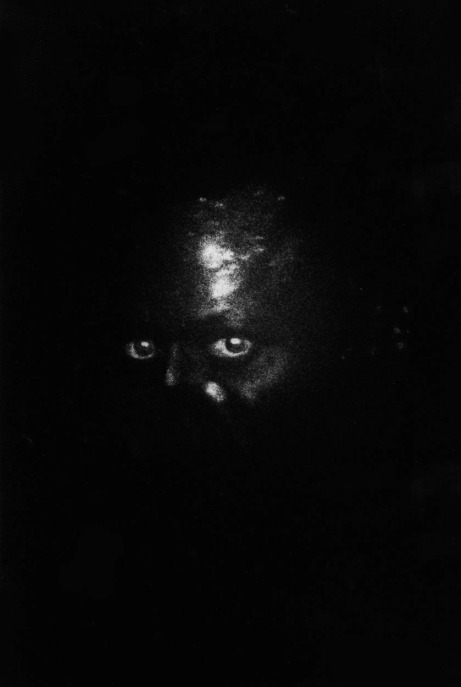
The success of DMX’s subversion of the dog trope likely apexed with his Woodstock ’99 performance. Before a majority white crowd of hyperthermic slavehunter descendants, DMX rocked what Thomas Hobbs calls “blood-red dungarees.” X “growls viscerally” and “convulses” across the stage in a manner “akin to a Bad Brains gig in a sweaty punk basement.” DMX—like Dred and Blacus before him, like ELUCID to come—subdues the monstrous, cowardly pack, and has them eating Milkbones out of his hand by the end of the 45-minute set.
9.
The first thing we feel on REVELATOR is a snarling, ravenous “fang bite” and the exhale of “dog breath.” We search for alternatives: the RZArector’s fangs on 6 Feet Deep (1994) maybe, a presence that Kodwo Eshun argues is akin to a head “filled with revelations that impeach the daylight.” We might think of the parallel universe of “The Big Rock Candy Mountains” (1928) where “dogs all have rubber teeth,” but REVELATOR doesn’t offer up that heavenscape—only a hellscape where teeth tear rabidly, rapidly. The “dog fangs [which dig] into black flesh,” Boisseron writes, are “deeply ingrained in popular culture.” We’d prefer the hip-hop context for “biting,” like when Rakim invokes “biting and borrowing” on “Follow the Leader,” where “brothers tried and others died to get the formula.” We’re on a “short leash” here, but Chuck D speaks of how he “cut the leash” on “Black Steel in the Hour of Chaos” and how prison bars “got [him] thinking like an animal,” and so I think we should act accordingly, tactfully, and lick our wounds.
ELUCID strafes us with 2-syllable units, iambs or IEDs, right from the start:
Fang bite Dog breath Short leash Pit fight
We’ve not felt shelling like this since the opening words of DMX’s It’s Dark and Hell Is Hot (1998):
One-two One-two Come through Run through Gun who? Oh, you don’t know what the gun do?
We’re propelled and pummeled by a Dark Enlightenment acceleration; unquestionably, we’re on our heels. ELUCID activates a sequence of 3-syllable units—anapests—as we descend into Hell:
From this height At this speed Downhill Careening
Later, the 2- and 3-syllable units alternate: “Shit that binds, / Spit out, / Ribs came spared.” Such blunt syllabics occur elsewhere on the album as well. “YOTTABYTE,” for instance, introduces a more dactylic, grounded pattern: “Hard science, / Scum gutter.” These are billboard throw-ups in Mister X’s Radiant City. They’re terse skull snaps like when Michael Gira sings, “Space cunt, / Brainwash” on “The Apostate.”
“I’m not psychic, but I’m reading,” ELUCID clamor-raps. The rapper has repeatedly denied the spiritual and supernatural in favor of tangible work, learning, reading. He much rather attend a demo or browse a bookstore than show his face at a séance or a church service. “The more I thought, the less I prayed,” he raps on “BAD POLLEN.” In this regard, he’s a dialectical materialist, much to the dismay of so many nimrod New Age seekers. ELUCID is not your self-help savior. Appropriating occult symbology in song is not inscribing sigils on the navel of a newborn. More likely he’s standing in solidarity with the child laborers pulling opal from the ochre mines of Madagascar. “Black Jesus hated bill collectors—I do the same,” he raps on “IN THE SHADOW OF IF.”
In The Conjure-Man Dies (1932), Rudolph Fisher’s Harlem murder mystery, the titular conjure-man, one N’Gana Frimbo, is the closest forebear to ELUCID, a practitioner of the aesthetics of alchemy but one who knifes through the nonsense:
There are those that claim the power to read men’s lives in crystal spheres. That is utter nonsense. I claim the power to read men’s lives in their faces…. Every experience, every thought, leaves its mark. Past and present are written there clearly…. My crystal sphere, therefore, is your face.
“I receive it, then I weigh it,” ELUCID explains. He’s no Knownot but he also knows that he knows nothing, in a Socratic sense (one day it’ll all make sense, trust me [TRUST NONE, FEAR ALL]). He’s a member of a tribe on a quest, receptive of vibes and stuff, asking questions like: What? Can I kick it? Does it live or die? Who gon’ tell me why? Who goes there? Who dare disturb the hive? He remains unflappable, constant, “still inside,” channeling his “honey child” while killa bees are on the swarm angling for the fatal sting.
Our “small world” is razed; it “devolve[s]” as hell is raised—it’s not that tricky. The dog’s got “jaws that grind” and “teeth that tear”; Dante tells us Cerberus “displayed his tusks” and “rends the spirits, flays, and quarters” his enemies. “Where’s a pit, there’s a plague,” ELUCID says, demonstrating syntactically that life is parallelism to Hell but we must maintain. Boisseron discusses the “hysteria around pit bulls” rooted in an “overblown fear of rabies,” and we watched a “plague” of reckless media representation caricature Michael Vick as the very animals he electrocuted. “Pit bulls have been historically used in America as a weapon of stigmatization against blacks,” Boisseron explains, and so every Black man takes up residence in the Bad Newz Kennel when the public deems it convenient, whether they would ever dare to hold the jumper cables or not. If the stigma doesn’t catch up to you, the sickness will. ELUCID’s “pit” evokes morgue trucks reversing up to the trenches in the potter’s field. Careful where you step, or else risk experiencing “a quick trip to glory if you slip.” Pitfalls on every corner, beneath the buildings of every block. Like DMX said on “Get At Me Dog,” If you don’t know by now, then you slippin’.

“Be not afraid,” ELUCID advises, bending Biblical. It is I. It is I. It is I. If we can keep up, he’ll usher us out of the ravaged world. If not, “don’t know, don’t care—get out my way!” ELUCID’s “in the garden,” his own private Gethsemane, agonizing and “pouring for everyone whole came before [him]” and didn’t survive the onslaught. He pours out a little liquor, and like Pac who had his “back against the brick wall, trapped in a circle, / Boxing with them suckers till [his] knuckles turn[ed] purple,” ELUCID is intoxicated by his own dogged determination. Pac was simply rewriting McKay, who likewise found himself “pressed to the wall, dying, but fighting back!” Glorious as it sounds, ELUCID’s exhausted—as we all are—by song’s end: voided. All he can put together are fragmented, clipped, incomplete idiomatic and figurative expressions: “razor walking”; “bridge to nowhere fast.” Still, he bites back. Like DMX, he’s “eating everyone eventually,” indiscriminately, re-establishing the order of “the world [that] is dog.” He, too, is dog. Sic ’em, and get sick wid’ it.
10. TEKNOHELL
Today the plagues of Revelation are…the disastrous results of…the irrational use of technology.
—Pablo Richard, Apocalypse: A People’s Commentary on The Book of Revelation (1995)
“Police dogs were often framed as technology,” writes Tyler Wall, a scholar of racialized state violence. He cites a Baltimore K-9 officer who claimed “[t]he dog is the most potent, versatile weapon ever invented…. You can’t shoot around corners, but dogs can go anywhere you direct them—like guided missiles.” These comments anticipated the NYPD’s rollout of actual automated, data-gathering robot dogs, of course. But “CCTV” and “YOTTABYTE” escort us into an arena of Ballardian extreme metaphors and emergent technologies—a teknohell—where “Spot bots” prowl every city block.

“CCTV,” co-produced by ELUCID and August Fanon, screeches like a dial-up modem gone diabolical—a discordant din of panic chords. They’ve programmed drum patterns around the sound of the CCTV shorting out—the dread comes in sine waves: megahertz hurts | multiplexing and motion-detecting | low-frame rate. The cameras are everywhere we look, but ELUCID splits the veil and the surveillance. The mandala is a panopticon, a C-band satellite dish for bodies to rot upon. Impaled by feedhorns. Parabolically resting in peace. In “a moment of clarity,” ELUCID fucks the noise and begs, “Don’t be mad at me.” I ain’t mad at cha. Who could begrudge the corner boy who cracks the lens of a varifocal security camera with a rock in the courtyard of the low-rises (they call it “the Pit” on The Wire)?
The ill communications that ELUCID was channeling on Armand Hammer’s We Buy Diabetic Test Strips continue to nauseate him. A year prior to that release, ELUCID told Gary Suarez that he was working to “dismantle what isn’t serving and then download and update with what does now.” For the man who “feel[s] a way about proving [his] identity to robots,” he can also acknowledge damage has already been done, which is evident in his diction. On SEERSHIP!, he despaired: “Every device I own knows my latitude.” On “NY Blanks,” he warned: “computers are listening.” In Jacques Derrida’s “Of an Apocalyptic Tone Recently Adopted in Philosophy” (1983), he describes a Tetsuo-like man/machine [MAchiNe] who loses clarity between the sender and the receiver of electronic messaging:
And there is no certainty that man is the exchange [le central] of these telephone lines or the terminal of this endless computer. No longer is one very sure who loans his voice and his tone to the other in the Apocalypse; no longer is one very sure who addresses what to whom. But by a catastrophic overturning here more necessary than ever, one can just as well think this: as soon as one no longer knows who speaks or who writes, the text becomes apocalyptic.
In this sense, REVELATOR is, at turns, an apocalyptic text. Much of ELUCID’s work has been. The cover of SEERSHIP! features a P1 phosphor font choice, as if it’s destined for a monochrome monitor. One might come to believe ELUCID writes in matrices of terminal green.
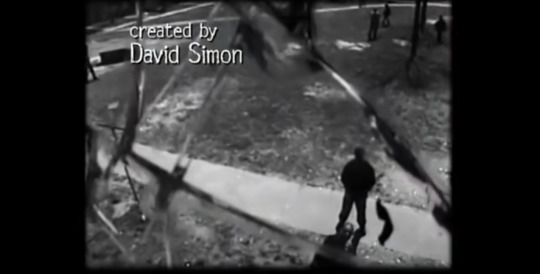
11.
In Fisher’s The Conjure-Man Dies, N’Gana Frimbo is questioned by Dr. Archer:
“You actually are something of a seer, aren’t you?” “Not at all…. I filled in the gaps, that is all. I have done more with less. It is my livelihood.” “But—how? The accuracy of detail—”
“Even if it were as curious as you suggest, it should occasion no great wonder. It would be a simple matter of transforming energy, nothing more. So-called mental telepathy, even, is no mystery, so considered. Surely the human organism cannot create anything more than itself; but it has created the radio-broadcasting set and receiving set. Must there not be within the organism, then, some counterpart of these? I assure you, doctor, that this complex mechanism which we call the living body contains its broadcasting set and its receiving set, and signals sent out in the form of invisible, inaudible, radiant energy may be picked up and converted into sight and sound by a human receiving set properly tuned in.”
ELUCID showcases his broadcasting set and his receiving set, but his carries the outlaw spirit of an illegal cable box or the pirate radio signal from the short-lived Dread Broadcasting Corporation out of West London in the 1980s. ELUCID as DJ Lepke in limbo.

12.
The title “VOICE 2 SKULL” evokes a note to self, a Nextel push-to-talk, or a voice-to-text: ELUCID as fully automated, as a cybernetic MC. But the human essence—the flesh, blood, and bone—is still there: “I get up before everyone and lose my mind first— / For even just an hour, I work in sound and feeling—sometimes fury, / Asking the whys and hows when lies turn to vows.” That is, he grinds; his work ethic, the grating of gears. He starts his day, travels where he will, but always “free roaming” and “pinging stupid” as a “transcontinental satellite receiver freaking forth.” On “XOLO,” as tek, he “reach[es] inside—only to [his] elbow, / [And] pull[s] it back out like [he] was rewound.” Like a VHS tape, or Betamax. Functioning as some new plastic idea. We’re all wired and wasting away with “mirror[s] in pockets” as we busy ourselves “looking hard in the camera.” Not squinting to make sense, merely modeling a manufactured exterior.
13.
Digital overlords don’t need free promo…
—ELUCID, ØKSE’s “Skopje”
The teknohell is ever-present on REVELATOR—you can’t escape its server rack bracket clutches. “Defrag the files,” ELUCID raps on “BAD POLLEN,” attempting to counter what Nathaniel Mackey calls a technology of decay. RFIDs, modems, CCTVs, pagers—all this tech isn’t anachronistic; it’s timeless—e-waste salvaged or scavenged—but ELUCID evolves, keeps it moving [...like a moving target], even if that means “bloody fingers on the keypad,” which we heard of on Valley of Grace. His own magnetic fields fuck up electronics; he lives in the “chaos hour shadow play” mentioned on “THE WORLD IS DOG.” “The situation’s unreal,” as Chuck D says on “Black Steel in the Hour of Chaos.” “There are no hard distinctions between what is real and what is unreal,” Harold Pinter responds. Ultimately, ELUCID is “wholly unimpressed by your social media metrics,” at least according to “MBTTS.” He offers up “brick and mortar rhyme for distorted time” and “offline [is where] [his] core thrives.” He knows what’s what: these gadgets and gizmos are “soon to be rendered useless: and then what?,” as he inquired on Small Bills’ “Even Without You.” Merchandise is Brand New Second Hand as you sit in an ergonomic swivel chair before Roots Manuva’s radiation-emitting dusty microwave. ELUCID searches for a truth beyond the motherboard.

14.
I tell you this in truth; this is not only the end of this here but also and first of that there…the end of history…the death of God, the end of religions…the end of the subject, the end of man, the end of the West…the end of the end, the end of ends, that the end has always already begun, that we must still distinguish between closure and end…. it is also the end of metalanguage on the subject of eschatological language…
—Derrida
…so let me shut the fuck up.
—Editor’s note [me]
Tell me a lie, tell me a truth becomes ELUCID’s Max Headroom mantra for “CCTV,” minus the sputtering, the glitching. We like to think that the “truth [will] find you where you at—it’s fine, it’s fair,” he raps on “RFID,” but, more often than not, revealing the truth requires trying. Your responsibility, Toni Cade Bambara insists, is to “try to tell the truth,” and “[t]hat ain’t easy.” It’s tough to summon the strength when we “have rarely been encouraged and equipped to appreciate the fact that the truth works.” The machinery of lies and disinformation come fine-tuned with a gleaming chrome finish. As for truth, we’re numb to its virtue; neutered by negative thoughts and clouded past experiences. But if we can pursue truth, prove it, and impress it upon our enemies, according to Bambara, “it releases the Spirit.”
The “cattle prod [will] shock you back some reality,” ELUCID raps. But truth can seem a hackneyed notion in the wrong hands. In Baldwin’s “Going to Meet the Man” (1965), Jesse, an abusive cop who takes sadistic pleasure in cattle prodding Civil Rights protestors, is charged with bringing the singing of jailed demonstrators to an end. He targets the “ringleader” of the group: “I put the prod to him and he jerked some more and he kind of screamed—but he didn’t have much voice left.” The protestor refuses to call for the others to stop singing, either out of defiance or debilitation from the beating he’s suffered, so Jesse’s frustration grows: “...the prod hit his testicles, but the scream did not come, only a kind of rattle and a moan.” Revisionist history can’t absolve the truth of that barbarity.
In one final [ex]plosive shout before “CCTV” transitions, ELUCID says, “Steal me your blues.” A call for reappropriation of what has already been plundered on a mass scale. The blues are never blameless. ELUCID collects blues and deranges ’em—traditional | twelve-bar | crowbarred | prison blues—deep cobalt with sapphiric crazing. REVELATOR most obviously invokes Blind Willie Johnson’s version of “John the Revelator” (1930), what with his scum gutter growl of Who’s that writin’? Jeff Place called Johnson a “guitar evangelist,” a man who was blinded by lye in his eyes at seven [the means of his marring and age should not go unnoticed], a reenactment, perhaps, of John the Revelator’s being dunked into the boiling oil cauldron—not nearly the “musky oils” ELUCID spoke of on “Obama Incense.” The teknohell is home to a Victor Talking Machine, no doubt, and the 78 RPM shellac record of Robert Johnson’s “Hellhound on My Trail” (1937) spins centripetal. RJ’s bottleneck slide screams phoenix as he sings, I got to keep movin’. For protection from the dogs—zig, zag, zig.
August Fanon and ELUCID sacrifice the frenetic for a straightforward refrain to conclude “CCTV,” something to mesmerize with layered vocals, subliminal messages not so sub- that they’re unmanageable. Take freedom: ELUCID wants you to hear the message, the charge. “All power to oppressed people” isn’t just a slogan for him; for others, as we know, it undeniably is. He asks for a “red light on the virtue signal for the come-latelys”; or, as PremRock says on ShrapKnel’s “Human Form”: “Closeted moderates post black squares then act scared of actual progress.” On “NY Blanks,” ELUCID “refuse[d] to kneel and pray for hashtag another slain name, / On the dashcam frame of sight.” Technology pervades every moment of life and language—from sonogram to dashcam and the SMS notifications of each and all else in-between.

15.
Child Actor’s production on “YOTTABYTE” traps us inside the machine with hex bolts knocked loose and rattling around. Again, technology works its way into everything. “Stints and priors, / Sweat labor, / August sun,” ELUCID raps, seemingly on a chain gang—the teknohell is a maximum security prison: biometrics | video analytics | signal-jamming | duress alarms. Data storage facilities bursting at the seams.
“Terabyte, gigabyte, niggas bite,” ELUCID spit on “Bitter Cassava,” adding with a whiff of cybersexuality, “I heard ass taste better in the summertime.” Do androids dream of having a romp with the provocatively named Deckard? Do Nexus-6 replicants have rape fantasies? “Came out the pussy and wrote a classic,” ELUCID says on “YOTTABYTE,” and I’m left wondering what Jodorowsky’s love machine from Holy Mountain (1973) might have to do with this. Cold and sterile tech-infused corporeality | conjugal visits with slinky cyborgs | proto-pornbots.
“SKP” presents as more sound poem than song—its patterns erratic, and therefore erotic—unpredictable with vocals pitched down and up arbitrarily. Andrew Broder provides a mellowed pulse backdrop, tunneling toward something visceral, and not the gear boxes and springs, the sensors and metal tubes, that make up a robot’s innards. ELUCID has previously proclaimed he was “a dyke in a past life,” a Sister Outsider standing alongside Audre Lorde: “Images of women flaming like torches adorn and define the borders of my journey, stand like dykes between me and the chaos.” “SKP”—Some Kind of Power—draws inspiration from Lorde’s “Uses of the Erotic: The Erotic as Power” (1984), which reframes eroticism, removes it from the teknohell.
I know you know the codes, ELUCID says. His lover has the key—they each possess a copy. And the key is crucial, at the crux of the relation; listen to what woods says on “INSTANT TRANSFER”: “It’s all skeleton keys on the keyring I keep, / Keys I never seen before for places I never even been, / Luxury cars—I key ’em and go to sleep.” Keys, keys, keys, as Angela Carter writes in “The Bloody Chamber” (1979)—to china cabinets and safes and every other secret place. The narrator’s husband, though, forbids his young wife from using one key in particular. Not the key to his heart, as she presumes (“skeleton key to ya heart,” ELUCID echoes on “CCTV”), but “the key to [his] enfer.” He teases and tantalizes her and throws all the keys into her lap as “the cold metal chill[s] [her] thighs through [her] thin muslin frock.” Something’s not quite right; “we was down singing off-key: how?” ELUCID says on “XOLO.” The key might crack the code | stroking and fondling | heavy petting | as artificial intelligence records the taps and timbre of your keystrokes, stealing sensitive passwords—a sensate focus therapy for anonymous internet users. Probably best to keep the key under the mat.
“The erotic is a considered source of power and information within our lives,” Lorde writes. ELUCID answers: “Knowing is enough—deepest core informing all.” The erotic, Lorde notes, “offers a well of replenishing and provocative force to the woman who does not fear its revelation.” “From here forth,” ELUCID says, “you spit, you scream, you burn my tongue too raw—be soft.” Erotic, Lorde explains, is from the Greek eros, “born of Chaos, and personifying power and harmony.” Harm may precede harmony; pain prior to reaching “beyond the posture and the program.”
“Call me out my name,” ELUCID commands, “I’ll be the one you cum for.” Even if he brushes against the sophomoric at times (“Baby, please pop that pussy for breakfast” would be one such example from the archives), ELUCID’s sex raps swerve sophisticated. Lorde says the erotic is often “confused with its opposite, the pornographic,” which would demonstrate sensation without feeling. When ELUCID says “call me out my name” to his lover, he’s exploring “how acutely and fully [they] can feel in the doing.” Lorde explains, “[A]s we begin to recognize our deepest feelings, we begin to give up…being satisfied with suffering and self-negation…with the numbness.”
The technological bent to “SKP” climaxes with connectivity (¿Tu Tienes WiFi?)—a mutual dependance—“power which comes from sharing deeply any pursuit with another person.” In 2020, ELUCID told Tim Fish about how a trip to South Africa inspired Valley of Grace (2017): “...my wife was there, she was still my girlfriend then, and she was working at a law center, working towards protecting sex workers…. So being there, she’s at work for at least 8 hours a day, and I’m in the flat just hanging out….” At the end of “SKP,” ELUCID declares “in a union made now, tomorrow anything…,” and we feel the phantom phrase “…is possible” in the absence that follows.
“There are many kinds of power,” Audre Lorde tells us, “used and unused, acknowledged or otherwise.” 2Pac, for instance, never achieved ELUCID’s level of erotic power in song. On “How Do U Want It?” (1996), Pac was forward with his proposal, seeking consent (“Tell me is it cool to fuck? / Did you think I come to talk? / Am I fool or what?”), but copped to his preference for pornographic perversions, the “positions on the floor” he invokes: “Ironic, ’cause I’m somewhat psychotic.” Lick before you bite, ELUCID raps on “BAD POLLEN,” his own nod to the erotic/psychotic dichotomy. But it’s more tempered than Pac’s imprudence. He seems to taunt Pac’s shortcomings on “YOTTABYTE”:
Wiggle with the lights on, Ripple off thrust, Ooh, it’s just us, Yes, I need it how I want it, Feel like Southern California with my belly full…
Not to say ELUCID’s erotic power is purely PG-13; it’s not. On “BAD POLLEN,” he “wake[s] up and thrust[s] inside [his] missus, / Two fistfuls of hair, [his] face buried.” Flashes of a possessive desire, an “I Wanna Be Your Dog” energy: So messed up—I want you here…in my room…I want you here. But even when ELUCID goes raunchy, it’s organic matter, raw materials—mud and bone and verdant muck—not nuts and bolts and a nexus of cables. His trysts always involve talking out the mud, crashing through the walls…, scorch, [and] stimuli response.

16.
I might work with the wires wet if we talking ’bout power…
—“INSTANT TRANSFER”
With SKECH185’s analog(ue) tape dispenser on loan (also note the Basinskian “disintegration tapes” mentioned on “IKEBANA”), ELUCID patches and splices the first bars of “INSTANT TRANSFER” in a terse trimeter:
Five side, keep the tape warm, Wrapped rays weighing way more, Racks raid how we wage war, Slack walk to a main course.
The alliterative and consonantal groupings (“wrapped rays”; “racks raid”; “weighing way”; “we wage war”; “slack walk”; “keep the tape”) and slant rhymes present an inconsistency that models a human touch—the warmth of the analog tape undermining digital media and the instantaneous [gratification and otherwise] operations of an ATM withdrawal, just as we see the plastic bank card repeatedly guided into the multi-function maw by a human hand in the “INSTANT TRANSFER” video.
Nostalgia is no retreat from the teknohell. Even on a memory song like “HUSHPUPPIES,” the hum of Integrated Tech Solutions interferes when ELUCID recalls the “static sizzle with the grease in stereo”—frying fish and the kitchen TV set in concert with one another. “HUSHPUPPIES” feels like a loose adaptation of Henry Thomas’s “Fishing Blues” (1928), a fond recollection of fish as sustenance. Both ELUCID and Thomas begin with an urgency; Thomas “went up on the hill about twelve o’clock,” and ELUCID speaks in a tongue-twisted, nursery rhyme: “Must find fried fish—it’s Friday.”
REVELATOR has us fearing for the worst: fish fried in sulfuric waters, gilled vertebrates pulled from the River Styx—but it’s not that. “HUSHPUPPIES” feels down-home, a brief view of before, of Bessie-time, of salve and saviors and stove-top safe haven. “Put on your skillet,” Henry Thomas sings, “Mama gonna cook ’em with the shortenin’ bread.” “HUSHPUPPIES” works as a child-vision folk song, much like the “choking on a church mint” episode of “Guy R. Brewer.” ELUCID is an artist composing twenty-first century folk ditties, intent on inclusion in the Roud Index. I’m wary of the “sugar water, lemon sugar, water lemon” lyric sequence, though—the words transmit, mutate, like a gain-of-function in the kitchen sink. I feel he’s trapped speaking with “the language of the on-again/off-again future, and it is digital,” as Laurie Anderson once said.
17. PEOPLE TEND TO THINK THAT A PAGER’S FOUL
In 1991, Q-Tip asked us if we knew the importance of a skypager. The responsibility fell to Phife Dawg to explain it in full:
The “S” in skypage really stands for sex, ………………………………………………….. At times I miss the pager so you don’t get vex, Having bad days like a voodoo hex, Conceptually, a pager is so complex that I be standing on the verge, ready to flex.
ELUCID portals us to that very ’90s dimension to pick up on Phife’s “-ex” rhyme scheme.
Skypage text, alphanumeric, Blind days—rain taste metallic, Dark roads lined with tall pine, Fire tongue in the annex.
Where Phife’s explication was elementary with its backronyming and monosyllabic rhymes, its simile and succinct storytelling, ELUCID’s post-millennial penchant for broken language and Holocene imagery elevates the archaic device of the skypager to the status of fetish item. One can see the huddled assemblage of survivors circled around the faint LCD glow on the annex floor, the acid rain falling through the collapsed roof.
18.
“14.4” drags us through the mass hysterics of Y2K mania with Saint Abdullah and The Lasso layering assorted ambient jazz touches to the Tron grid. ELUCID and SKECH185 fuck with the trellis modulation, raising a “Napster ’99” download speed from the titular 14.4kbps. They float over dial tones: “I dial in; you dial it down,” ELUCID says as he receives the signal from Armand Hammer’s “Landlines.” He’s charged with a “couple hundred-thousand watts,” so “do hold the line.” ELUCID and SKECH rap with “revolutionary millennial movements,” in the words of Eugene D. Genovese, “born in social catastrophe or in the fear of impending catastrophe.” Still, though, in the West African tradition, “time is cyclical and eternal; the religious tradition cannot then therefore readily provide for an apocalypse.” Fear all? Maybe it’s more fear none than we first thought.
I sometimes configure ELUCID as Aaron Dilloway (of Wolf Eyes, and—for our purposes here at present—their 2006 limited-release Dog Jaw) with a contact mic—full-contact stage presence | kilowatts killing | bringing the pain in a really real way. He wades in distortion, awash in both antiquated and active teknology (“*69—hit redial,” he remarks on “XOLO”). Hell is populated with tek—yottabytes of it like motes in sunlight, refracting his digipoetics. He announces proudly, “Afrika Islam loop in the key of my Lord,” which is a permanent—nearly park jamming—register for him to operate within. He dials in to Zulu Beats on WHBI 105.9 in New Jeruzalem and cracks codes for the afterfuture.

19. THE HAINTS OF HAM RADIO
Never polemical, ELUCID makes aslant references to oppressive histories, dating back antediluvian. One second he’s “in ya sundown town holding [his] dick dolo,” and the next he’s bouncing to bear witness to an “illegal chokehold.” He time travels from crabgrass frontiers to a sidewalk slab on Staten Island. He may be “too old to comfortably rock logos,” but he’s in-the-ever-know [and the ever-now] of former lives—he embodies Gift of Gab running from Feds in his red Pro-Keds, and he hits the racks of Saks Fifth Avenue with the Lo Lifes. Nowadays, though, he’s Naomi Klein’s No Logo incarnate. In another nanosec, he’s a po-mo narcocorrido singer reading “the note like Chalino, except it’s off the SIM card.” He’s hopping through traversable wormholes of genealogical blues “from Ham to Cush to Nimrod.” Settle our assassin’s eyes on Ham, hm?
In A Season in Hell, Rimbaud “set out in search of the true kingdom of the children of Ham.” Wyatt Mason argues that part of Rimbaud’s legend can be attributed to the rumors of him as “the scoundrel who sold slaves in Africa.” Though it’s accurate that Rimbaud was free roaming, sub-Saharan, his vagabondage through the Horn of Africa might not have included slave-trading—that point is disputed by his biographers. In The Rebel (1951), Camus called Rimbaud a “bourgeois trader” of percussion rifles and Ethiopian coffee, but made no mention of slaves. In 1994, China Achebe stated that “[w]hen Rimbaud became a slave trader, he stopped writing poetry” because poetry and slave trading “cannot be bedfellows.” When he wasn’t tagging up the Luxor Temple on a lark in Egypt or running guns across the border into Shewa land, Rimbaud’s travelogue was interlarded with diagnoses of typhoid, synovitis, and osteosarcoma—his right leg eventually lopped off. Perhaps we can ascribe his disease-ridden body to A Season in Hell’s most profane moments, such as when he writes, “I’m an animal, a nxggxr. But I can be saved. You’re all fake nxggxrs…”

The so-called “curse of Ham,” a blasphemy on Black people courtesy of Christian whites, has long contaminated the discourse—a shibboleth adorning the flowstones and helictites of the teknohell. “According to the scriptural defense of slavery,” Eugene D. Genovese writes in Roll Jordan Roll: The World the Slaves Made (1974), “...the enslavement of the blacks by the whites fulfilled the biblical curse of Ham.” But Genovese’s research indicates “the slaves did not view their predicament as punishment for the collective sin of black people. No amount of white propaganda could bring them to accept such an idea.” When ELUCID talks of “hammers hang[ing] on loop” on “THE WORLD IS DOG,” or “hammers out the Hummer” on “VOICE 2 SKULL,” I construe this cargo pants weaponry, this pakinamac in the back of the Ac’ (or Hummer), as a means of countering white propaganda, comparable to Treach’s chainsaw or Havoc’s scythe. Throughout REVELATOR, we find ELUCID going ham—hard as a motherfucker—but ELUCID’s too humble for any Tisci gilded throne. Instead, think of him as John Henry driving steel through the carpal tunnels of sinners and thieves. He sings a Scaramangan screed as he works, something gleaned from Seven Eyes, Seven Horns (1998): “Alphabetic hammer, magnetic grammar.”
ELUCID advances with “apocalyptic movement,” which Derrida defines as “the gesture of denuding or of affording sight,” a gesture which is sometimes “more guilty or more dangerous,” such as when Noah gets krunk in his tent and “Ham sees his father’s genitals.” ELUCID sees through the myths, the slander; instead, he exposes us to a soundtrack of staticky swells as he ascends out of the teknohell. I imagine the noise is a replication of what Joyce’s radio in Finnegans Wake (1939) sounds like. Here’s that signal recounted superlatively:
tolvtubular high fidelity daildialler, as modem as tomorrow afternoon and in appearance up to the minute…equipped with supershielded umbrella antennas for distance getting and connected by the magnetic links of a Bellini-Tosti coupling system with a vitaltone speaker, capable of capturing skybuddies, harbour craft emittences, key clickings, vaticum cleaners, due to woman formed mobile or man made static and bawling the whowle shack and wobble down in an eliminium sounds pound so as to serve him up a melegotumy marygoraumd, eclectrically filtered for allirish earths and ohmes.
In Kodwo Eshun’s More Brilliant Than the Sun (1998) | [“MBTTS,” ahem], he writes that “Long-distance telecom systems intensifies sensations of imminent Revelation.” Oh, indeed.
20. POST-INDUSTRIAL DOOM GOSPEL FOR THE GODLESS
On “Old Magic,” ELUCID announced himself as the “revelator, armed and dangerous,” so nothing he does on this album should come as a surprise. This lot of doom gospel spells shatters expectations, though. “I’ve been revelatin’” is what he told us on “Smile Lines,” and he’s yet to cease or even slow. The Book of the Seven Seals bulges, busting its binding and bending back its raised bands. REVELATOR, lyrics transcribed and beats notated in neumes, passes as ELUCID’s Book of Revelation.
I see it all, Michael Gira throat-sings. I see it all I see it all I see it all I see it all I see it all… over the sunn oh godspeed charnelhouse chanting and gunmetal grind of SWANS’ “The Seer” (2012). ELUCID is all-seeing as well—omniscient shit. It wasn’t always this way. On “Blame the Devil” from Save Yourself, ELUCID admitted that “revelation had [him] spooked.” In his preface to The Adventures of the Black Girl in Her Search for God (1932), George Bernard Shaw describes the Book as “a curious record of the visions of a drug addict which was absurdly admitted to the canon under the title of Revelation,” which only adds to the terror for an ’80s child who grew up with crushed crack vials underfoot.
On “Blame the Devil,” ELUCID saw the “seven eyes, seven crows” and “was lost.” “Now I’m found,” he would continue, “End of days—amazing time, / Everybody’s got a word—mine just happens to rhyme.” No longer cowering in church corners, surrounded by the congregants of what he has called a “death cult,” ELUCID’s Revelation remix has a liberation theology reverb. Pablo Richard’s Apocalypse: A People’s Commentary on The Book of Revelation (1995) places the curious record in the context of revolutionary power:
Revelation arises in a time of persecution—and particularly amid situations of chaos, exclusion, and ongoing oppression…. Revelation transmits a spirituality of resistance and offers guidance for organizing an alternative world…. Revelation is wrath and punishment for the oppressors, but good news (gospel) for those excluded and oppressed by the empire of the beast…. Revelation teaches us to imagine the present and final eschatology with a sense of joy and hope…. The book of Revelation is helping to create a new historical and liberating language.
21.
In The Book of Revelation: Apocalypse and Empire (1990), scriptural scholar Leonard L. Thompson points to the difficulties of understanding the “symbolic, metaphoric, even bizarre language of the seer.” John the Revelator confessed to being “in the spirit” when he composed the book, what Eugene D. Genovese might call “religious frenzy” in another context. Thompson receives the Book of Revelation as a nesting language, one in which “highly symbolic language” nests into “ever-larger contexts—ultimately into a cosmic vision that includes the whole social order, the totality of nature, and suprahuman divinities that invade but transcend both society and nature.” I think it wise to receive ELUCID’s lyrics in a similar manner. Lucien Goldmann might call it Towards a Sociology of the Rap Album. “The seer tends to develop his material concentrically into ever-widening rings,” Thompson contends. ELUCID reps such a structure in his verses, in his songs, even lending his own phraseology to the process, be it those “shimmer rims spinning loopy” on “VOICE 2 SKULL” or the “orbitings” we hear about on “IKEBANA.” ELUCID will “leave the meter running” only to “trigger doomsday.” He sips “Ethiopian coffee” and seconds later “space junk” floats by. We’re hipped to the particular and the panoramic. Scaramanga was similarly skilled. Samuel Diamond writes of how “Seven Eyes, Seven Horns” is “as much a meditation on symbology, semiotics, and brand identity as it is an erudite MC’s spin on a passage from the Book of Revelation.” Or, as Scaramanga Shallah himself says on the song, “What a script…” [as in, whew].

22. MYSTIC STYLEZ
All a mystery…
—“THE WORLD IS DOG”
…nothing could have been more impressive than this cool, deliberate deep voice, stating a mystic paradox in terms of level reason.
—Rudolph Fisher, The Conjure-Man Dies (1932)
To bring it back to that damnéd Derrida essay once again [back is the incredible], MC Deconstruction redefines “apocalypse” as revelation: “Apokaluptō, I disclose, I uncover, I unveil, I reveal the thing that can be a part of the body, the head or the eyes, a secret part, the sex or whatever might be hidden, a secret thing, the thing to be dissembled, a thing that is neither shown nor said…” This revelation “not only affords seeing but also affords hearing/understanding.”
We’ve prior seen ELUCID as mystagogue—a mystik journeyman, a Walkman invader—he whose function is to initiate us into the mystery. As Guru was above the clouds, the mystagogue positions himself, according to Derrida, “above the crowd [which] he manipulates through…a crypted language,” but, despite what some dum-dums [to borrow a term from diggity Das EFX] may argue, ELUCID is not beyond understanding. We must strive to understand misunderstanding; we must endeavor forevermore to miss understanding. Those who throw fits and fail to accept these norms—I have to presume—have not been listening to hip-hop very long or well. “Words mean things but don’t have to,” ELUCID declared with Derridean flair on “Split Tongue.” “[I]f anything has outlived its usefulness it is ‘coherent’ metaphor, one with explicit contours,” writes E. M. Cioran in The Trouble with Being Born (1973). “It is against such metaphor that poetry has unceasingly rebelled, to the point where a dead poetry is a poetry afflicted with coherence.” “I’m okay with not understanding,” ELUCID said on Small Bills’ “Here Be Dragons,” “—I’m okay in the dark.” Dark Man X knows all directions.
Listening to ELUCID’s music, you enter a delirium, which Derrida refers to as a Verstimmung—“a social disorder and a derangement, an out-of-tune-ness…. The tone leaps and rises when the voice of the oracle takes you aside, speaks to you in private code, and whispers secrets to you.” On “IKEBANA,” ELUCID cops to “talking out [his] head, a fever set in.” Like Rimbaud in Obock, shivering, with his knee gauzed over, not a poetic thought to be found.
23. SOUND & CEREMENT
Sound has a grammar to it—believe me—that will cause that thing that you call bending to open up in a way you won’t believe it.
—Ornette Coleman (2005)
…I just bend the rhyme…
—“Sir Benni Miles” (2021)
ELUCID, more than any other active MC, embodies a compositional approach that conflates poetics and musicality in a manner that doesn’t favor or diminish either—symbiotically rendered, synchronistically flexed: the orphic bend. In an epistolary novel by Nathaniel Mackey, Orphic Bend denotes a fictional album title of a fictional band. ELUCID asks on “RFID”: “Why play if I can’t bend the rules?” To forbid ELUCID these ludic junctures would be ludacris, a loss of not only file data but of finely wired rap filigree. ELUCID stays bent in both senses—his sentence inclinations, his word inebriations—bent like Miles Davis’s mouthpiece; dead bent like DOOM’s swilling death-drive to fund these experiments. These are “games I win at—mark me,” ELUCID gloats, but he also invites us to “share this reality.” If we’re willing, he’ll leave none of us behind; he won’t orphan us.
“We’re all eventually orphans,” Mackey has said. Elsewhere (namely, “Sound and Sentiment, Sound and Symbol [1987]), he kindles, he forges, the meaning of orphan and Orphic, “an orphan being anyone denied kinship, social sustenance, anyone who suffers, to use Orlando Patterson’s phrase, ‘social death.’” Mackey continues:
Song is both a complaint and a consolation dialectically tied to that ordeal, where in back of “orphan” one hears echoes of “orphic,” a music which turns on abandonment, absence, loss. Think of the black spiritual “Motherless Child.” Music is wounded kinship’s last resort…. Music is prod and precedent for a recognition that the linguistic realm is also the realm of the orphan…. This recognition troubles, complicates and contends with the unequivocal referentiality taken for granted in ordinary language…. Poetic language is language owning up to being an orphan.
ELUCID has previously instructed us on “the difference between loneliness and being lonely,” referencing like a hand reaching out—to Gwendolyn Brooks, who feels the “under buzz” of loneliness. But ELUCID’s bent is in the direction of populating his cathedral with the motherless children of his bastard style.
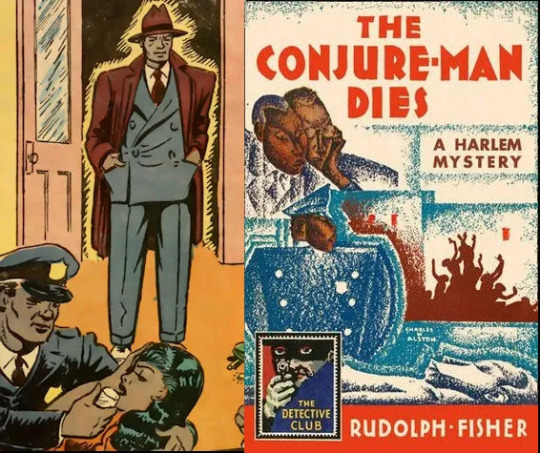
24. INSIDE REPEATING NUMBERS
To stave off the dogs, the teknohell, and the unknown opps, ELUCID makes endless calculations but with an imprecise science. One can imagine the setting for such calculations resembling N’Gana Frimbo’s consultation room, what with “obliquely downcast light” and “lateral walls…adorned with innumerable strange and awful shapes.” Those strange and awful shapes—like glyphs carved onto dusty clay tablets—included “gruesome black masks with hollow orbits, some smooth and bald, some horned and bearded; small misshapen statuettes of near-human creatures, resembling embryos dried and blackened in the sun…forbidding designs.” The conjure-man’s mantelpiece showcases a “murderous-looking club, resting diagonally.” The club is actually “the lower half of a human femur, [with] one extremity bulging into wicked-looking condyles, the other…covered with a silver knob representing a human skull.” ELUCID holds the club like a stylus, dealing in tally marks and totalities until the skull smudges out an answer.
Numbers are concrete, seemingly. “Numbers don’t lie, but they damn sure don’t tell stories either,” ELUCID rapped on “NY Blanks,” skeptical of statistics. On “IKEBANA,” he starts with “3800 out the credits.” I ain’t count it, he admits, “but it’s sweat labor.” He narrows the narrative with estimates: “ten or something”; “on time, but off-key”; “almost, almost over…so close…almost over….” These are “complicated chemicals” that only work to deepen what Rimbaud called “numerical visions.” Do the math. On “YOTTABYTE,” it’s “dead money [and] thirteen guineas for a pickaninny piano.” On “BAD POLLEN,” he “brought a trunkful of tiny violins to the bloodletting.” ELUCID can “play one on each finger for every seven bodies.” These aren’t exact measurements or accurate costs. As he says on “INSTANT TRANSFER,” he’s “counting up in the dark” (in Frimbo’s consultation room, right?). Persevering and perseverating on “14.4”: “System error, / Less than zero, / Humanity pending.” Sounding like he needs to get his affairs in order.
The numbers game inevitably leads to money—nasty business like toxic assets and credit derivatives—and money is time; time, money. “Can’t clock the kills,” ELUCID says on “THE WORLD IS DOG,” echoing Master Ace in ’90 (“Can’t Stop the Bumrush”) and Jay-Z in ’96 (“Can’t Knock the Hustle”)—earning miles while on the clock as a touring musician, tallying transatlantic and domestic flights. But is there ever a time when he’s not “waiting on money, thinking of murder,” as he raps on “BAD POLLEN”? Does the hustle, the bumrush, the killing ever cease? Or is it an interminable loop of episodes mimicking bell hooks’ oft-quoted (by all the wrong people for all the wrong reasons) opening sentence from “Killing Rage: Militant Resistance” (1995)? “I am writing this essay sitting beside an anonymous white male that I long to murder,” hooks wrote. “I’m at the age they start to count my nights out,” ELUCID raps on “VOICE 2 SKULL,” because death or revolution seems “a black power nap away” (“IKEBANA”). “Time wore us out,” according to ELUCID, speaking in the past tense as if the deal has already gone down, the jig is up, the end is here. The “24-hour drones” he mentions on “14.4” survey the damage. Too easy to get greedy and selfish at the end (“Give me a minute…give me five…”), shuffling off this mortal coil as “we wait—who knows the hours?”
25.
“IKEBANA,” despite the time-and-numbers crunch, sketches a scene of restorative habits, a survival guide for the godless. It falls short of He-is-risen optimism (Orpheus is the figurehead here, not Jesus), but we’re headed from hell to the heliosphere. ELUCID wishes the world “good morning” with “oatmeal” and “Ethiopian coffee.” He’s calculating to find peace. He feels that “everybody knew” but him—crying it out; they must know the secret to peace. Miscalculations leave him envious. Everyone laughing at his ignorance, at “all [his] comings and goings”—the state-of-the-art GPS tracking of the teknohell. RFIDs on the heels of his feet triggering field detectors.
The solution is a sometimes-turn inward: Being alive, I must look up. If the Ethiopian coffee doesn’t cut it, he’ll order an “everything bagel with the tofu scallion” or “vacuum the whip” (as he does on “VOICE 2 SKULL”). We’ve heard of his domestic resolve before. On woods’ “As the Crow Flies,” ELUCID was “cleaning up [his] kitchen, / Emptying the fridge, bleaching counters, [and] sweeping corners.” By placing his “silverware in order,” he rebuilds the rubbled world. Peace is plucked from panic elsewhere, as on “YOTTABYTE” where he’s “squatting in a Barcelona hotel room playing Wu-Tang Forever,” observing the world rather than his phone, nourishing himself through sights rather than storing up the cache and cookies of his frequently visited sites.
After many calculations, the epiphany points toward what he details on “BAD POLLEN”: “I squeeze my children’s hand and walk harder against the wind,” the same wind that rustles the dead roadside bracken, as Cormac McCarthy writes in The Road (2006). ELUCID turns to his children, his family. woods, it should be stated, does the same, as noted on “Niggardly (Blocked Call)”: “I walk ’em to school, then the park, / Hold they little hands when we cross the street.” A small step to cross the street is far simpler than crossing the Rubicon.
“IKEBANA” is another ELUCID and Jon Nellen production, and Gabriel’s muted horn is buried in the mix of the song’s bridge, a distant and dour reveille as ELUCID sings softly. As he bemoans everybody knowing what he doesn’t, Nellen’s percussion pulls us to where ELUCID wants to be: looking up. Being alive, he’s looking up out of hell. We hear his will to struggle, to survive, and to exist, but we also hear our will to “look up,” or research meaning, reflected—manufacturing it if we have to—as in, “You must learn” (life being nothing more than a boogie down production). Improve ourselves through awareness of others, of our loved ones especially, of our situation within all the scattered “scorching space junk, x’s and orbitings.” You must change your life, in Rilke’s words.
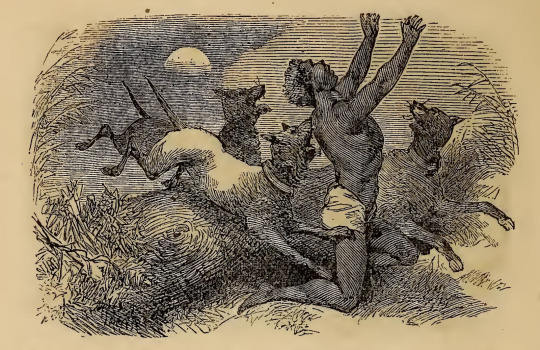
26. MAN THREATENS LANDLORD
Kill your landlord, no doubt…
—“Roaches Don’t Fly” (2021)
“SLUM OF A DISREGARD” celebrates thirty years of skullduggery since The Coup’s “Kill My Landlord” (1993), but underhanded housing policies—what ELUCID calls “comforts of material conditions core-rotted”—are nothing new. Look at Langston Hughes’ “Ballad of the Landlord” (1940):
Landlord, landlord, My roof has sprung a leak. Don’t you ’member I told you about it Way last week?
Last week is “way last week” because any leak sooner than soon, quicker than quick, becomes an inundation, a deluge, and the subsequent damage, mold spores, and stench overwhelms. Hughes’ subject alludes to withholding rental payment until the landlord “fix[es] the house up new,” but the landlord threatens back with “eviction orders.” The threat is communicated through the tenant’s account, through a series of questions—a dialogue masquerading as a monologue for the first five stanzas of the poem. The landlord is absent, a ghostly presence only there to extract profit. When the tenant turns to intimidation (“If I land my fist on you…”), we suddenly hear the landlord’s voice summoning police and precipitating an ugly and familiar scene:
Copper’s whistle! Patrol bell! Arrest. Precinct Station. Iron cell. Headlines in press…
For his threat of violence (which the landlord exaggerates as an attempt to “overturn the land”), the tenant receives a sentence of “90 DAYS IN COUNTY JAIL.” But for his neglect and threat of dispossession, the slumlord suffers nothing.
“The house is built on deceit,” Boots Riley raps on “Kill My Landlord,” acquired through primitive accumulation and the successive decades of sniping and stealing, compressing a courseload of Proudhon property is theft readings into a solitary verse. ELUCID’s landlord—nay, slumlord—is on a “Tel Aviv holiday” when the crisis hits. While the landlord uses ELUCID’s monthly rental payments to feed IDF soldiers [...my taxes pay police brutality settlements, billy woods shouts back], ELUCID struggles to get him on the phone. When he does, he finds the slumlord’s “sincerity was threadbare” and “urgency been missing.” ELUCID “smile[s] like watermelon slice,” a simile which upends the slumlord’s own race-based neglect through subversion. ELUCID will grin and bear it (for the time being), but he won’t let it go without signaling to the slumlord—or himself at least—that he’s privy to the power dynamics which undergird the exchange. In doing so, ELUCID enacts a stratagem used by poets before him. “We sliced the watermelon into smiles,” Terrance Hayes writes for fourteen consecutive lines in one of his sonnets from American Sonnets from My Past and Future Assassins (2018). In Langston Hughes’ “125th Street,” the poet doesn’t allow racist stereotypes to overshadow Black joy:
Face like a slice of melon grin that wide.
Hayes, Hughes, and ELUCID invoke historical [mis]representations by combining the smiling, subservient Tom caricature with the conniving, watermelon-thieving Coon to deliver a knowing wink to the reader/listener. In a promo video for REVELATOR, images of James H. White’s Watermelon Contest (1896) flash across the screen—an Edison film under Brakhage-like production techniques.
The longer ELUCID stays on the line with his slumlord, the sharper the sting. Mahmoud Darwish once asked, “Why did you lean on a dagger to look at me?”—and ELUCID listens long-distance to the slumlord “turn the dagger slow” with every second that passes. This is an abrasive exchange—ELUCID’s complaints and his characterization of the slumlord’s speech effectively evoked through consonance: “Too late to make it right, / Tongue-tied talk, / Make noose quick.” The slumlord stumbles over his words, speaks offensively, and we’re reminded to “believe what people say they are and do.”
Like “Ballad of the Landlord,” the conversational lines within “SLUM OF A DISREGARD” are one-sided. We hear ELUCID, in father-mode, pressing: “If this happens all the time, what’s the plan?” The slumlord’s excuses are elided, for his words are meaningless drivel. “Both my boys have my eyes,” ELUCID coldly explains, “—don’t force my hand.” His hand, like the tenant’s fist in Hughes’ poem, communicates to us that stakes is high. “Don’t force my hand,” he pleads, but Darwish writes that “we are forced to return to the inhospitable myths / where we have no place.” On “Between the Lines” (2001), Slug rapped: “If I see you as a threat to my seedling or my sibling, / I’ll die to pull the plug on your machine.” This kind of escalation really isn’t escalation at all—it is meeting the violence of the slumlord, a violence aimed directly at the face of children. “Black mold, / Black lung, / Black child,” ELUCID chants, delineating the equation. He receives “no callback” and his fury rises. An international call culminating in a rat’s nest of cords and wires—a switchboard in a landfill.
“Abuse of power comes as no surprise” isn’t just a Jenny Holzer holdover, it’s ELUCID seeing and stating that which has become so tiresomely obvious. We would have to delude ourselves to see something other than what stands before us. “I am not a prophet claiming revelation, or that my abyss reaches heaven,” Darwish writes in “Mural” (2003), “By the full power of my language I am the stranger.” We’re no stranger to oppressive language, language that oppresses. On October 9, 2023, Israel Defense Minister Yoav Gallant said, “We are fighting human animals and we are acting accordingly.” A year later, nearly to the day, ELUCID tells a truth to counter that lie: My landlord is a Zionist.

27. FRESH AS FUCK ON STOLEN LAND
With his home in disrepair, ELUCID looks elsewhere to ease the tension of his rent-strife. “IN THE SHADOW OF IF” documents a search for refuge. He seeks to construct alternate realities and “alt timelines” where he’s making “[his] own breaking news” and “Lucy shit[s] diamonds” instead of habitating the sky with them, her kaleidoscope eyes gouged out. But you would need kaleidoscopic vision, of sorts, to manifest such a place. Though ELUCID has copped to “nam[ing] a thing or two into reality” on “SKP,” “IN THE SHADOW OF IF” postulates an added if—if he wasn’t “born in the year of this country’s last recorded lynching,” maybe he’d be better off. But as he says on “Microdose,” the question—and the reality—is “who stopped recording?”
Fleeing the city, ELUCID heads upstate and beyond—somewhere coastal that he can walk “barefoot in the sand.” We discover him “stepping over dead fish in a bucket hat.” This is the downbeat of deep ecology. “Salt and sulfur,” he raps, and he “can’t tell where the wind blows.” Gusts die down and Hell reemerges (as if it ever left) | guts tighten. “I’m on that Black leisure for the increase,” he says, calling in a reservation at The Black Dog while reclined on his beachchair on Martha’s Vineyard’s Inkwell. ELUCID uses his ink well. But this all seems a reverie, an abstraction, as he challenges us to “pick a coordinate / [And] show [him] where localized perceived violence didn’t come with receipts, / White sheets.” Klan presence pervades any and all vacay getaways. You might not see the hoods and horses up north, but you will see “too many flags—one too many flags.” He’s not gonna front, “seeing all those flags outside the city make[s] [him] nervous.” These are ELUCID’s dead flag blues. They represent “physically violent reminders.” Natasha Tretheway writes that flags “inscribe both a figurative and literal white supremacy onto the physical landscape and the psyche landscape of the American imagination.” Go back to “The Blackout” (1998) where Jadakiss warned that those “rednecks up in the mountains’ll try to slay you.” ELUCID ends up feeling like he’s “been cursed to concrete,” cordoned off by external forces, told to stay in the city, which makes him wonder how he’ll keep from going under.
“The devil is a lie,” he exclaims, realizing “we are the ecology.” The mob made the devilry, manufactured it out of gurgling hate, and unfortunately “a moment to pause never goes on sale,” so peace can’t be purchased. ELUCID told us he was a “green book reader” on Armand Hammer’s “Stole,” navigating the netherworld of where no Black man, woman, or child is welcome. Time is warped; he angles through a simultaneity of oppressive timelines—“twenty years behind and ahead.” The “Black futures” he sought to build on “Stole” start to feel unattainable. Instead, he finds himself gripping “black steel in the hour of submission in search of a place to land… / …in search of a place where our blood don’t precede us.” Fact is, they built it on Indian graves. The land is composed of blood-soaked soil—runaway slaves torn to shreds, lynchings, and extrajudicial killings. On the original “Black Steel,” Chuck says, “Here is a land that never gave a damn.” ELUCID wants “purple rain” and “wild greens,” a lush and fertile vista where’ing the flowers grow and the price of avocados is free. “Search[ing] for a place to land”—forty acres won’t do. Can a reparations calculator really tell the cost of dispossession and plunder?
28. WHO’S THE SUN SEEKING?
Xoloitzcuintli guides ELUCID into Hell, but ELUCID guides us out of Hell, penning a travelogue in miniature—traffic patterns and images of languid BK denizens. Virgil-level guidework, as Mos Def once said, “from the tree-lined blocks to the tenements,” so you don’t get vicked. On “No Grand Agenda,” ELUCID spoke of his “daydream on city buses, / Brooklyn pushing [his] button,” and on “XOLO,” we appear to receive the full panorama once the sound of sulfuric screeches and barking dogs in the distance fades:
Staring at the sun— a corner florist fell asleep with his mouth open on St Felix, downhill on Dekalb, Green light succession, Stop-and-go, rubbernecking, Swerve, change directions, Head in a smoke cloud…
He squints through the sunlight so that “he won’t burn” his retinas. Not to worry—he comes protected. REVELATOR’s cover image (photograph’d courtesy of A. Richter) shows ELUCID in shades. We can map the antecedents—be it Miles Davis’s shield sunglasses, Porsche 5620s with the frame screws (precursor to Kool Moe Dee’s steez); be it Sun Ra’s Courrèges Eskimo slit glasses that he rocked on the cover of Rolling Stone in 1969; be it Afrika Bambaataa’s future-geometry set of shades. ELUCID’s might as well be a Makrolon face-shield, as he’s protected from the welder’s flash of Hell’s ultraviolet flames. On “CCTV,” he fends off the “sunshine and teargas,” the “flash bang” of dispersal orders, the anti-crowd dog’s growl and howl, the Brooklyn confetti of uprising. He does so just as the Irish travailed through the Troubles, as depicted with punkish punctuation in Ciaran Carson’s “Belfast Confetti” (1989)—with shrapnel (the titular “confetti”) in motion like movable type. ELUCID’s text goes explosive in the same ways as Carson’s: “Suddenly as the riot squad moved in, it was raining exclamation marks, / Nuts, bolts, nails, car-keys. A fount of broken type.” ELUCID’s sunglasses allow him to “see now”—all the “details” with “color-cut clarity.”
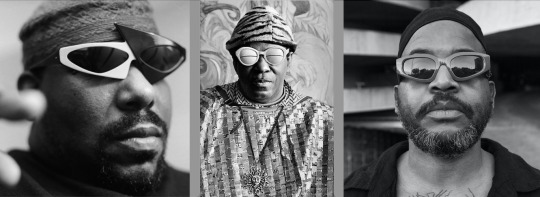
Elevating out of Hell requires him to forge his own way, an avenue that becomes familiar: “I’m acclimated, black upon a path, / I made it outta clay.” Rakim crafted in the same Creator-cum-MC way on “Follow the Leader”: “Planets as small as balls of clay.” Get the fuck back, ELUCID orders, Stay the fuck down. Run for your life; duck down—his alarum’s a Rude Awakening. When ELUCID summons N.O.R.E.’s “theoretical niggas on the run eating,” the tempo starts to increase, steadily. Fire kindles and ELUCID says what we already feel: “The house is burning here…yeaaaah.”
In William Melvin Kelly’s A Different Drummer (1962), Tucker Caliban is a slave descendant who, after serving the Willson family for generations, has had enough. He shoots dead his livestock, salts his land, and sets his house aflame in an act of defiance. The Lasso’s tempo-shift tracks with Kelly’s description of the inferno:
Orange flame climbed the white curtains in the center section of the house, moved on slowly to the other windows like someone inspecting the house to buy it, burst through the roof with the sound of paper tearing, and lit the faces of the men, the sides of the wagons, and the faces of the Negroes…. Sparks curled up and then died, dissolving against dark blue sky…. [T]he rubble of the destroyed home looked like a huge city seen at night from a great distance.
Tucker’s family leaves the town of Sutton and the other Black residents soon follow, baffling the white residents who watch the procession of “suitcases or empty-hand[s]” headed for the state border. As a crowd watches Tucker blast bullets into his horse and cow, witnessing the “sticky blood r[u]n down” their fur,” as they watch him ax “the twisted tree” on the Willson Plantation, “on which his great-grandfather and grandfather had been slaves and then workers,” they think he’s gone mad. Enlightened Harry Leland refutes this, though. “It’s his land. He can do anything he wants to it,” he tells his young son.

29. P.L.O. STYLE
You may burn my poems and books You may feed your dog on my flesh…
—Samih al-Qasim, “Enemy of the Sun” (1968)
ELUCID dropped a zim zala bim on Armand Hammer’s “Solarium,” but—in recognition that magic can’t be the only survival method—he now promotes a zigzagzig. DJ Haram provides the sound design—a metallic gnashing, a chittering of rebar stakes, and a bass that throbs, muted and distorted, like eustachian tubes swollen from proximity explosions. On “Old Magic,” ELUCID offered a “double portion of protection,” but even charms and conjurings aren’t always enough. Under “war clouds” and a “cruel sky,” his “niggas survive like a moving target.” Zig. Zag. Zig. With the Knowledge, Wisdom, and Understanding of the last letter in the Supreme Alphabet—the zed, the end. Another bend of the body—an Orphic bend toward protest. The thousands upon thousands of Gazan orphans crying out to be heard.
For years, dead prez’s M-1 has argued that the struggle for Black liberation and the struggle for Palestinian liberation were “the same struggle.” “We have always been an international cadre,” he has said, “We have to see ourselves as a movement without borders.” Teknology allows deaths far and wide to be televised, rewound, reproduced on a “watch again” | replay | “share” exploitation loop. “I didn’t watch the video,” ELUCID says—and who can say which video? We wade through yottabytes of video footage like tonnes of debris. The video could be of grieving mothers in Khan Younis carrying the corpses of children, or it could be of Philando Castile bleeding out in the passenger seat of his Oldsmobile 88. ELUCID willed himself to not watch the video—to not tune into the Black death | Palestinian death broadcast—because he already “remembered in [his] body,” in his bones in which the trauma sings, in the code genetically imprinted.
The specter of Palestine pervades REVELATOR. Listeners are more likely to scan ELUCID as “abstract rap” than “conscious rap” or “political rap,” but that’s only because ELUCID’s art is so innately revolutionary and activist, lacking the sharp edges and defined features of more contrived artists. The abstraction is that the unacclimated will perceive ELUCID as a mystic on the mic rather than a rebel. He can be both; he can defy categorization; he can perform more powerfully than any single genre tag or pigeonhole could signal.
The history of solidarity reaches back to the 1970s with communiqués shared between the Black Panther Party and the Palestinian Liberation Organization (Method Man’s P.L.O. Style would never…). Kwame Ture (née Stokely Carmichael) dreamt of “having coffee with [his] wife in South Africa” and “having mint tea in Palestine.” Liberatory lucid dreaming. We collectively hope—and work—for better futures, for the dogs of Abu Ghraib and the hounds of the Great Dismal Swamp pace the same Hell. “I shall not compromise,” Samih al-Qasim writes, “And to the last pulse in my veins / I shall resist.” al-Qasim’s poems were discovered in George Jackson’s San Quentin cell after his death. “Enemy of the Sun” would even be misattributed to Jackson because he had transcribed the poem by hand.

ELUCID finds the energy, the caloric boost, in “locust and wild honey”—embracing this ascetic appetite of John the Baptist. He changes out his alpenflage cargo pants for a camel’s hair robe and leather belt about his waist (getting down with the animal pelts). He shelters in a “deeper shade of carnage,” turned from a whiter shade of pale, and “stare[s] into the fire,” scrying, divining answers from the glowing embers. On “14.4,” he said he “live[s] between two mirrors,” spitting catoptromancy raps wearing the “bulletproof Girbaud” from “YOTTABYTE,” backpocket containing a bulletproof wallet. Layers of protection. It’s the only way to “fix up sharp,” as he says on “IKEBANA” with dizzee rascality. Dressed to impress, he’s a “stiff-lip maroon.” In Maroon Societies: Rebel Slave Communities in the Americas (1973), we learn that “in Surinam, as in Haiti, Jamaica, and elsewhere, warriors underwent complex rites and wore amulets intended to make them bulletproof…. [I]t was their gods and obeahs that spelled the ultimate difference between victory and defeat.” You already know ELUCID’s been spellling. And because the world always has been and continues to be dog, Cujo, Stephen King’s rabid St. Bernard, can be traced to Cudjoe, the Jamaican maroon leader. “A fearless rebel [who] boasted numerous bloody victories against the British,” Boisseron writes.
When ELUCID sees the “heads of state laughing” on “ZIGZAGZIG,” he knows they’re “liars” and that “hate has a logic.” They laugh “an idiot’s unbearable laughter,” to quote Rimbaud, still sweating through his Hell szn. But so are we all, grappling with the fact that “there’s no conscience, no authority.” ELUCID “live[s] to tell the story, / …to sing the song”—witness to atrocities, articulator of awfulness. When he can, he hammers out a warning. But he’s always on alert for imminent attacks which strike “without a warning.” Despite our teknological advances, we’re still a primitive society—our world still reduces to rubble, routinely. MPR500 precision-guided missiles fall from the sky and a Palestinian child stashes snacks in an abandoned IDF ammunition box. We search for survivors by hand—“Stony ground, metal poke out rubble, / Body twist angles akimbo, / Covered heads huddled”—hoping and praying for signs of life—head aching like rebar through skull, an inglorious Phineas Gage.
On “Revelation Narrative” from Horse Latitude (2017), we hear the voice of a young child calling out: I want mama. How prescient. But the past tells the present, the future. 1948 | 1967 | 1987 | 2000 | 2008 | 2023 | & every increment in-between. ELUCID calls “from river to sea in lieu of peace, absence of truth.” He finds the gutless heads of state “guilty as charged.” They’re “monster[s] out the darkest abyss,” and—like dogs, like hellhounds—they exhibit a “gnashing of teeth.”
The death toll tolls for thee. John Donne felt the weight of every dun: “Each man’s death diminishes me, / For I am involved in mankind.” ELUCID makes the same pitch, even to those deaf to reason. His mathematics don’t need to be supreme; the most basic arithmetic tells a truth:
Who can still ignore the score? One more—to what end? Man-made horror beyond comprehension.
30. I WOULDN’T TRUST IT IF THE POET DOUBT
After Revelation come a Genesis…
—Small Bills, “Falling Up” (2020)
No variety of literary originality is still possible unless we torture, unless we pulverize langage.
—E. M. Cioran, The Trouble with Being Born (1973)
ELUCID pulverizes language. The lyrics on REVELATOR read like Bible page cut-ups, like Gysin and Burroughs put the scissors to ’em, like garbled Ghostface transcriptions. Narrative gets negated—not to confound, but to complicate communication. In doing so, ELUCID mirrors our shattered contemporary speech patterns, only it's art not the garbage glibness that the Geto Boys apprised us of in ’89—talkin’ loud but ain’t saying nothing. His Orphic bend and cadence flexing leave us levitating, lost in what Rimbaud calls a “hallucination of words.” More from Rimbaud:
I regulated the shape and movement of every consonant, and, based on an inner scansion, flattered myself with the belief I had invented a poetic language, that, one day or another, would be understood by everyone, and that I alone would translate…. Worn-out poetical fashions played a healthy part in my alchemy of the word.
On “VOICE 2 SKULL,” ELUCID cops to “complicating noun combinations over drumbreaks.” He felt the existing “language insufficient—chess pieces to the checkerboard.” His new language includes words for the living and “words for the departed” (“ZIGZAGZIG”), as if a seraph touched a burning coal to his lips. His diction ushers in cosmic agonies. His voice is “the strange instrument of death,” loaned from the conjure-man Frimbo. Listening to REVELATOR, I see the colors, geometry, and nonlinear wanderings of Wadada Leo Smith’s scoring of improvisation, his Ankhrasmation language articulated into words.
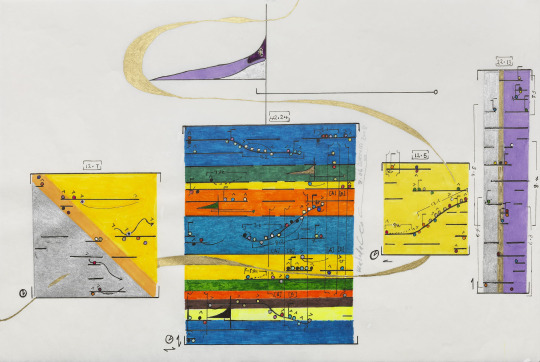
31.
In 1965, Amiri Baraka ended his liner notes to The New Wave in Jazz on this hushed note: “New Black Music is this: find the self and kill it.” Nathaniel Mackey has interpreted Baraka’s statement in the following way:
...in the course of improvising and getting to the point where you can play free music, you have to find yourself. You have to find out what your sound is. It may be something innate, but you have to practice and find what it is, where it is, and how to get it out, and how to translate it through a horn or a piano or a bass—whatever—which you likely call “technology.” How do you technologize yourself? How do you utilize that technology to render something that may be unspeakable, or there before not spoken—and maybe unrenderable? How do you get out a version that at least approximates that self and, at the same time, registers your refusal to be satisfied that you have properly and authoritatively, or with some finality, articulated that self?... In some ways, you have to be prepared to lose that self, or even to be an instrument of losing it, which is to say, to be killing it.
By this measure, ELUCID has found out what his sound is. On REVELATOR, he’s getting it out, violently. He’s translating it through his trauma mic—that is his chosen teknology. He has killed the self, and—to speak in the terminology of today—he keeps killing it.
“This ELUCID for whoever’s asking,” he once said on Armand Hammer’s “Resin,” and he’s forever been “staring at the sun” (“XOLO”). Often overlooked is the irony (or anti-irony, depending) of the MC’s name. Elucidate—to “throw light upon,” to “render intelligible,” perspicuity for the patron saints of post-rap. These ideas are at odds: How can he complicate and clarify? Make the equation make sense [ELUCID = light = “sun”]. “[W]e know that every apocalyptic eschatology is promised in the name of light, of seeing and vision,” Derrida writes, “and of a light of light, of a light brighter than all the lights it makes possible.” John the Revelator’s apocalypse is “lit by the light of El, of Elohim,” he adds. [T]he glory of Elohim illuminates it [21:23]. It’s as if ELUCID is “applauded by sunrays,” as Saul Williams says on “Elohim (1972).” Gnaw on this while you head-nod:
...what imposes itself as the enigmatic desire for vigilance, for the lucid vigil, for elucidation, for critique and truth, but for a truth that at the same time keeps within itself some apocalyptic desire, this time as desire for clarity and revelation, in order to demystify or, if you prefer, to deconstruct apocalyptic discourse itself…
ELUCID takes on the apocalyptic tone, and whoever takes on the apocalyptic tone comes to signify to, if not tell, you something. What? The truth, of course, and to signify to you that it reveals the truth to you.

Images:
A close-up of “the Envious,” Anonymous, The Last Judgment, (ca. 12th century), Gold and glass mosaic, Santa Maria Assunta, Torcello | A hand-colored woodcut of a 19th-century illustration shows an escaped slave trying to elude slave hunters and their dog. (North Wind Picture Archives/AP) | Gilbert Shelton, The Fabulous Furry Freak Brothers, Unknown issue (detail) | Bill Hudson, “Parker High School student Walter Gadsden being attacked by dogs in Birmingham, Alabama,” The New York Times (May 4, 1963) | McGruff the Crime Dog PSA, “Don’t Talk to Strangers,” 1984 (screenshot) | Robert Cohen, “Ferguson police officers during a protest in August 2014” (Associated Press) | DMX, “Get At Me Dog” music video, dir. Hype Williams, 1998 (screenshot) | Tadayuki Naitoh, “Miles Davis” (1971) | Jacob Riis, “The Trench in Potter’s Field on Hart Island, New York,” (ca. 1890) | Barry Williams / Getty Images, “Mayor Eric Adams and NYPD officers look at a robotic device from Boston Dynamics” (2023) | The Wire theme song, dir. David Simon, 2002 (screenshot) | Dread Broadcasting Corporation flyer (ca. 1981-83) | Unknown photograph of computer desk (c. 1999) | Stephen King, Cujo, first edition cover, 1981 (detail) | Joan E. Biren, “Portrait of writer Audre Lorde at work at her desk, surrounded by papers, books, and posters” (1981) | Image of ham radio (Lehigh Special Collections) | Self-portrait of Arthur Rimbaud in Harar, Ethiopia (1883) | Scaramanga, Seven Eyes, Seven Horns, interior cover art, Sun Large Music (1998) | Rudolph Fisher, The Conjure-man Dies, first edition, Covici-Friede Publishers (1932) | Illustration in Abel C. Thomas’s Gospel of Slavery, 1864 (detail) | Gordon Nye, “New York City Rent Strike” in the Yiddish newspaper Di Varhayt (1907) | Afrika Bambaataa (unknown) | Sun Ra, photograph for Rolling Stone (1969) | REVELATOR album cover, Alexander Richter (2024) | Richard Ansdell, “The Hunted Slaves” (1862) | “Black Panther Party founder Huey P. Newton outside an unnamed Palestinian refugee camp in Lebanon,” Unknown photographer (1980) | Wadada Leo Smith, “Kosmic Music” (2008) | A close-up of “the Envious,” Anonymous, The Last Judgment, (ca. 12th century), Gold and glass mosaic, Santa Maria Assunta, Torcello
17 notes
·
View notes
Text
howdy folks! it's time to talk about some Religious Trauma!
i grew up born and raised into the LDS (mormon) church. every single member of my immediate and extended family was mormon. luckily i was raised in oregon, so it was relatively chiller culturally than utah or idaho, but ideologically the beliefs are the same.
when i was 11 (1999) i came to the realization that i didn't believe in the church. this revelation was largely due to the fact that i didn't believe that being gay was wrong. shout out to card captor sakura for part of this, because i thought the older brother and his friend would be cute boyfriends.
now, thinking homosexuality was actually totally normal and fine was COMPLETELY against church doctrine. just a couple years before the church had come out with a "new revelation" called "The Family: A Proclamation to the World" that specifically stated that marriage was between a man and a woman and emphasized that people who violate the laws of chastity will "one day stand accountable before god." it even calls on the government to promote these views for "families."
i was in open defiance of revelation. this was supposedly god's word given to the prophet and i disagreed. i thought gay people should be able to get married, have families, live happy lives. i then thought if i don't believe this, what else don't i believe? it turned out. . . all of it. and i couldn't tell anyone. i was a kid. everyone i knew belonged to the church. plus my dad was verbally/emotionally abusive, i didn't even want to imagine what he would do to me if he found out.
but i couldn't keep it all in. i shared a room with my sister and we would sometimes have talks in the dark before bed. during one of these nights she was telling me about a trip to the temple she took to do baptisms for the dead with a group from church. in the stillness of the room i quietly said "i don't know if i believe in the church." we didn't speak about it again until i was 19.
a few months later when my sister was sleeping at a friends house i was sleeping in our room by myself. i had grown in my conviction that i didn't believe in the church. i had to keep it secret. i woke up in the middle of the night to a pitch black man with red eyes standing at the end of my bed staring at me. i was convinced it was the devil. he knew i didn't believe anymore. it was confirmation that god had abandoned me. i couldn't move. the second i regained control and the man was gone i ran to my parents room scared out of my mind and asked if i could sleep in the chair in their room. i didn't tell them about the devil. i didn't want them to ask why he would be in my room.
i know now that it was sleep paralysis. it wasn't the devil in my room, just my brain misfiring and scaring me. but the church made me believe as a child that because i believed that people, no matter who they are, should be happy, that god abandoned me and left me to the devil's mercy. i didn't try to believe in the church after the incident. i couldn't. once a benevolent god throws you to the devil because you learned to love better than him, you abandon him right back.
#exmormon#religious trauma#mormonism#sometimes it sneaks up on you#get out here god#i don't want you
28 notes
·
View notes
Text
A Little Catholic Calendar Math for March 1959
Something I can't believe I didn't do earlier, especially regarding my book of revelation post (here) is the calendar math on the Creel murders for both Henry and Edward.
Specifically, I want to talk about Easter of 1959.
As we know, Edward's murders occurred late on March 21st, 1959, and the bodies were discovered the next morning: March 22nd, 1959.
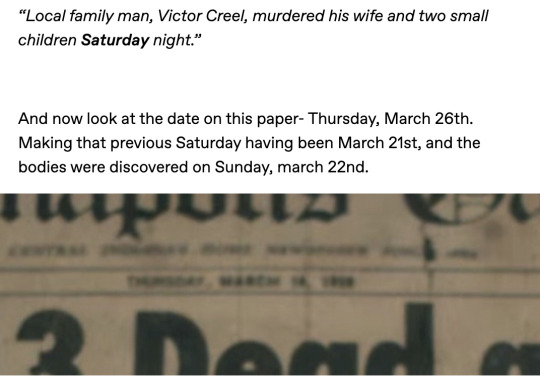
(lifted from Em's post here)
Can we guess what that Sunday was? Anyone?
It was Palm Sunday.
Palm Sunday being when Jesus enters Jerusalem, marking the beginning of Holy Week.

It also happens to be the day Edward would have officially been entered into HNL.
Interestingly, the Saturday before Palm Sunday is known as Lazarus Saturday, as it marks the day when Jesus raised Lazarus from the dead as proof that he would be resurrected when the time came.
A miracle of resurrection...on the night of Edward Creel's murders. (Staring at El's resurrection powers, featured front and center in ST4...)
Now, as we also know, the Creel boys ended up in a week-long coma:

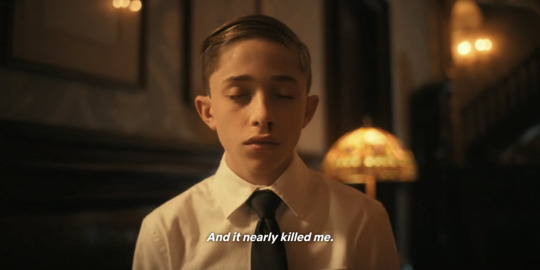
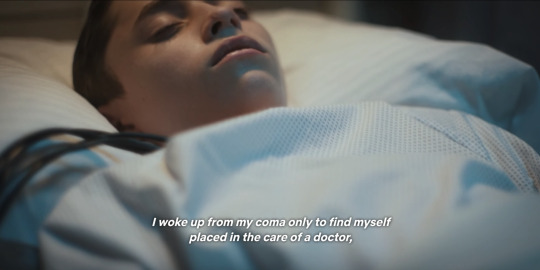
That next Saturday is Holy Saturday, also known as Black Saturday or Easter Vigil...
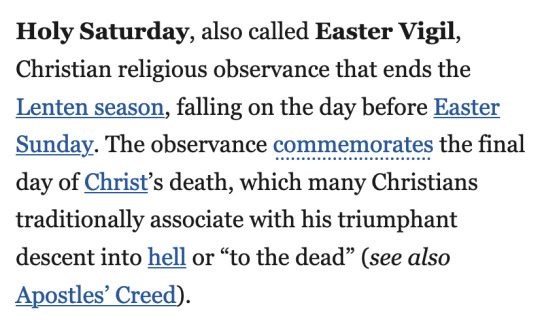
...Commemorating Christ's descent into Hell.
—cough cough—
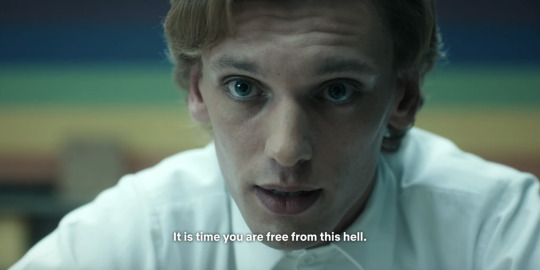
Anyway.
Edward, then, would have woken up on Easter Sunday:

...making his story an altered version of the resurrection of Christ.

That was Edward. Now, let's talk about Henry.
Henry's murders took place the night of Wednesday, March 25th, 1959, and the bodies were discovered the next day: Thursday, March 26th, 1959.

Holy Wednesday and Holy Thursday respectively.
What's so special about Holy Wednesday?
Holy Wednesday, also known as Spy Wednesday, is the day that Judas betrayed Jesus.

The bodies, then, were discovered on Holy Thursday, the last mass before Easter.

Then Henry, like Edward, has his coma. However. This seven-day coma means that Henry does not wake up on Easter Sunday.
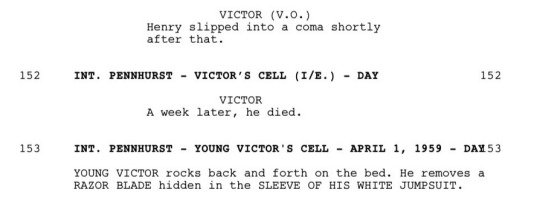
He wakes up on April Fools.
He's a false Christ. He's not the droid we're looking for.

None of these dates line up again until...you guessed it: 1986
Chrissy dies on March 21st, Friday of Sorrows. She's found on March 22nd, Lazarus Saturday. Fred dies on Lazarus Saturday. Max is cursed on March 23rd, Palm Sunday. Patrick dies on March 25th, Holy Tuesday. Max falls into a coma on March 27th, Holy Thursday. The full gang meets up after the 2 day jump: March 29th, Black Saturday.
Season 5 will pick up after March 30th: Easter Sunday, 1986.

All of this corroborates what I've been saying since March: We've got a holy trinity, but it's not the one you think it is.
As I laid out in my Book of Revelation post, Edward/Vecna/001 has a frankly insane amount of Catholic God coding.
Here are some highlights, if you don't want to read the entire thing:
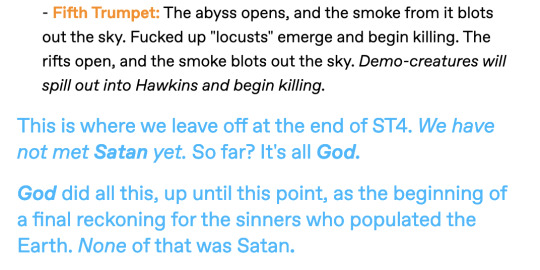
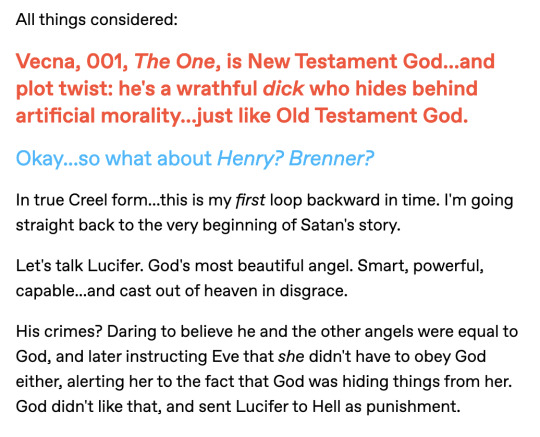
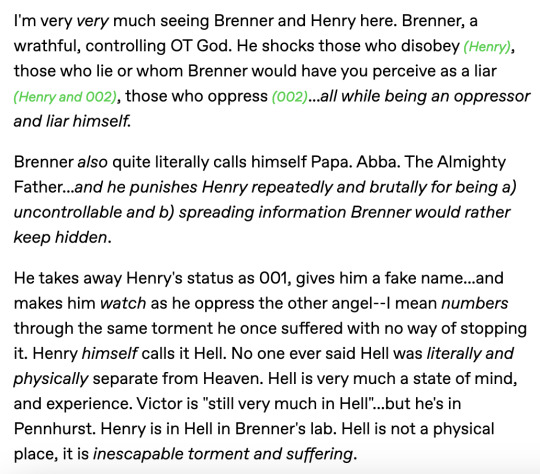
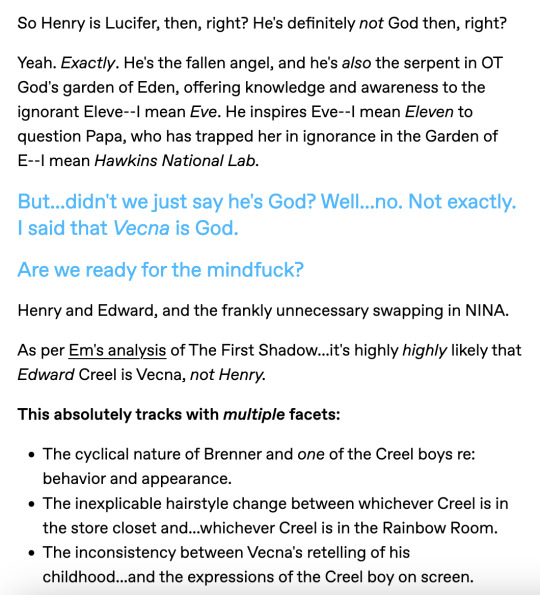
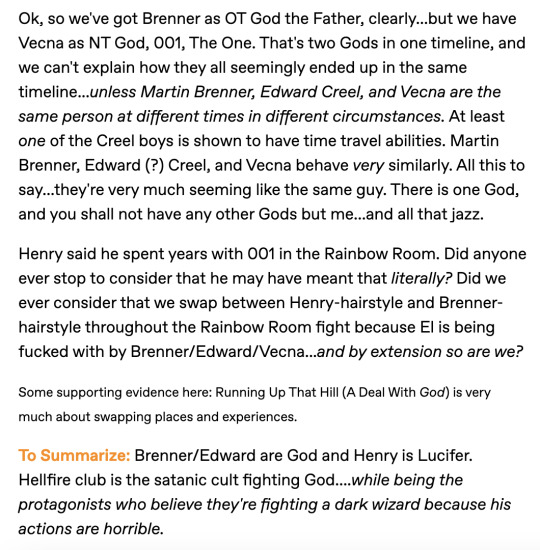
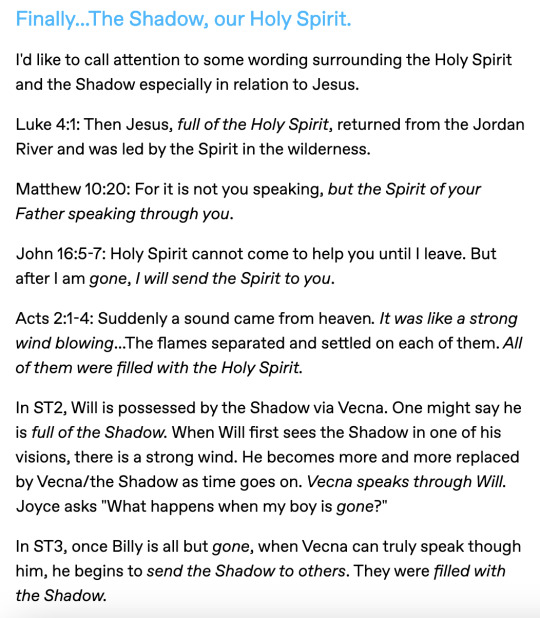
Our Holy Trinity, in Stranger Things, is likely Edward, Brenner, and the Shadow. Christ the Son, God the Father, and the Holy Spirit.
And all of this...with Henry and El as false/failed Christs, scapegoats for the real deal (see: El being blamed for both One and Vecna's murders, when in fact she's been standing against both the entire time).

This post also serves as my retraction re: Will as Christ. (Gasp! James retracting a statement? Say it ain't so...) I'd like to send the statement in another direction, because this isn't me saying that Will is unimportant. While, in my opinion, Will is not a part of our big Holy Trinity...I personally see him as a prophet, much like St. John of Patmos, rather than one of the Big 3. That's not to say I'm staunchly against him as a Christ figure, but it just doesn't hit quite right for me anymore.
47 notes
·
View notes
Text
Charms of Fate: Chapter 6
Pairing: Professor!Remus Lupin x Fem!Professor!Reader
Series Masterlist

Plot: Amidst the echoes of a bygone era, you return to Hogwarts years after parting ways. What begins as a journey fueled by nostalgia transforms into an unexpected reunion with Remus Lupin, now a Defense Against the Dark Arts professor. As the past intertwines with the present, the two former classmates navigate the complexities of grief, the resurgence of friendship, and the unwritten chapters of their shared history in this tale of rediscovery and the magic that binds them together.
Warnings: none (if there are, please let me know)
_____________________________________________________
The staff table in the Great Hall was lively with subdued chatter as you hunched over a newspaper, your focus on the article about Sirius Black's reported sighting. The news sent a shiver down your spine, a mix of nervousness and curiosity. Why would Sirius, a notorious figure, be heading toward Hogwarts of all places?
Your gaze shifted to Harry, who sat among the students, absorbed in his own thoughts. The realization struck you like a lightning bolt. That's right. Sirius was Harry's godfather, and it suddenly made sense. He must be coming here for Harry. Concern etched lines on your forehead as fear for Harry's safety gripped you.
Munching on a muffin absentmindedly, you couldn't shake the feeling that there was more to the story, fragments missing from the puzzle. Remus' absence didn't go unnoticed, and you missed him terribly, though you understood. Last night was the full moon, hence Snape's unbearably awful timing of interrupting what would have had you kicking your feet the rest of the night in your bed.
A scowl formed on your face as the realization dawned upon you that Snape had managed to disrupt what could have been a pleasant evening. Glancing in his direction, you found him smirking as if he knew what you were thinking about, seemingly pleased with the disturbance he had caused. The satisfaction evident on Snape's face only fueled your annoyance, leaving you to grumble inwardly at the unfortunate turn of events.
As the time drew near to start your class, you picked up the Daily Prophet, intending to scan the headlines before heading to your classroom. The day unfolded predictably until the end of your last class. Amidst the shuffling of students leaving the room, Hermione Granger approached with an urgency in her expression.
Hermione said, "Professor, Snape gave us an essay on werewolves."
Your heart skipped a beat, frozen by Hermione's revelation. However, she wasn't finished.
Hermione continued, "I know about Professor Lupin. I know he's a werewolf. Harry thinks Snape's trying to poison him. He saw Snape taking potions into the DADA classroom."
Feeling the weight of the information, you hastily closed the door and cast a muffling charm. Hermione, seeking confirmation, sat down as you explained that Remus hadn't shared anything about his condition, but you harbored suspicions.
You stated, "I believe he is, but Remus hasn't told me anything. And please, you mustn’t say anything. Not even to Harry and Ron.”
Hermione breathed a sigh of relief but remained cautious, promising to keep it between the two of you. The conversation continued, with Hermione expressing concern about Snape's true motives.
Hermione asked, "Do you think Snape is really trying to poison Professor Lupin?"
You assured her, "No, it's most likely Wolfsbane. Snape might be many things, but I doubt he'd go that far."
After Hermione left, a surge of rage propelled you to Snape's office. Throwing open the door, you found him muttering something sarcastic.
In Snape's dimly lit office, you confronted him, the air thick with tension.
You exclaimed, "How dare you?"
Snape, looking up with a sneer, retorted sarcastically, "Clearly, the concept of knocking before entering is beyond your comprehension."
You fired back, "I know what you're doing, Snape. Trying to expose Remus, get him fired. What's your endgame?"
Snape leaned against his desk, an inscrutable expression on his face.
Snape replied, "Remus is a danger to this school. A werewolf teaching children—absurd. I'm merely looking out for the safety of the students."
You scoffed, "Safety? More like you're relishing the chance to ruin his life. Why can't you leave him alone?"
Snape retorted, "Leave him alone? A werewolf hides behind the facade of a teacher. I won't stand by and let him endanger innocent lives."
Your anger flared, "You don't care about the students. You just want to satisfy your vendetta against Remus."
Snape, unfazed, remarked, "Vendetta or not, it's the truth. Werewolves are a threat, and Dumbledore should see that."
You shook your head, "This is about your personal bias, Snape. You can't see past your hatred."
Snape's eyes narrowed, "Hatred or not, I won't allow a monster to roam freely in this school."
The heated exchange reached a peak, and it was only Professor McGonagall's entrance that halted the brewing confrontation.
Minerva interjected, looking shaken, "Something terrible has happened. Follow me, both of you."
As you, Snape, and McGonagall left the office, the lingering animosity between you and Snape hinted at the continued tensions yet to be resolved.
You stand in the midst of the chaos. Students were gathered around the slashed portrait of the Fat Lady. You found yourself standing between Minerva and Snape, trying to make sense of the commotion. Dumbledore arrived, his voice cutting through the panic.
"Silence, everyone! Quiet down!" he commanded, his eyes scanning the crowd. "What happened here?"
Amid the murmurs, the Fat Lady, now in a different painting, spoke up with a tremor in her voice. "It was him, Professor Dumbledore! Sirius Black! He attacked me!"
Gasps echoed through the room. Dumbledore's expression darkened as he surveyed the damage. "Are you certain, my dear? Can you tell us anything about his whereabouts now?"
The Fat Lady hesitated before responding, "He's gone, Professor. Fled into the night. I didn't see which direction."
Dumbledore's gaze swept across the room. "Minerva, Severus, (Y/N) gather the students to the Great Hall. I will alert the rest of the staff and the Ministry. We must ensure the safety of everyone at Hogwarts."
As the professors ushered the students away, the realization hit – Sirius Black, the supposed traitor and danger to Hogwarts, was now on the loose within the castle's grounds. Merlin, I wish Remus was here right now.
#remus lupin#remus lupin x y/n#remus lupin x you#remus lupin x reader#older!remus lupin#older!remus lupin x reader#professor!remus lupin x reader#professor!remus lupin#harry potter#hermione granger#ron weasley#hogwarts#jk rowling
42 notes
·
View notes
Note
how did you come to join rlds/coc?
Sorry it took me so long to get to this question. I just knew it was a long answer.
I think my testimony gives a good idea, and i'll include . Because I felt the presence of God calling me to go join them is the overarching answer, but I can also give points that drew me in.
But in a few some points:
I fell in love with the modern RLDS version of zion (and some of the old one too. nothing to do with israel.)
I saw they strived to be an inclusive place.
The Community of Christ's Enduring Principles are things I want to strive to live my life by.
The community made me feel very welcome and I saw people conduct themselves in a Christ-like manner
The community is very tight knit. society needs more of that.
Like, there is a certain behavioral affect (? cultural distinction?) that many members have that i thought was strange at first but it’s lovely. It’s kind, loving, and welcoming, and you adjust to it very quickly imo. Even to the lingo, which was a fun process.
Continuing Revelation. Saw evidence of fulfilled prophecy in the Doctrine and Covenants and the spiritual growth in the church over the years
Continuing Revelation in general. I like that my faith is alive like that. We have prophets, God could reveal new truths for new scripture tomorrow. We are encouraged to be prophetic ourselves and discern the future together, i like that.
Also, no new scripture allowed in the mainstream? why not? does God still not talk in this way? great points in my head.
The communal aspect to everything is good. Just like how any sect of mormonism should imo The people i reached out to while seeking (investigating) were very kind to me and open to my questions. They were also there for me spiritually, and became friends.
I could email leadership with questions and get responses. At one point, one of the church Presidents reached out to me.
It’s academically welcoming. I was able to accept the book of Mormon as scripture when taught from a 19th century point of view. This, in turn, made me much more comfortable with the Bible. Community of Christ has an official statement on how to read scripture and there is scripture on how to think about and use scripture too.
I can even acknowledge when the history and the religious text don’t match. Because scripture doesn’t need to be historically correct to be sacred and hold an important message from the Lord.
Not really a reason but it is there: Joseph Smith III rocked and was intended to be next. It shouldn’t matter. But what does matter is that he set the church on a good path imo. Emma too. Out of all the early schisms of mormonism I would have to go RLDS belief wise, because Nauvoo era theology isn’t something I believe in. I think Smith got caught up in his own head and desires for much of it. No offense meant to post Nauvoo mormon sects.
This does not mean I haven’t picked some things up from Brighamites. For example, Trinity doesn’t work for me. And I pray to Heavenly Mother. I believe in one Divine source with many expressions. But that doesn’t mean “anything goes” and I accept it, just knowing that God speaks to people of many cultures all over, as the good book (of mormon) says.
But yes. This is why Community of Christ. Not that there are all common Community of Christ beliefs, but I thrive here spiritually and am encouraged to grow all the same. Older testimony under cut that gives detail
I encourage y'all to watch this on video rather than just the text edited version i put here. not to be like "watch my talk on it" but please, watch my talk on the subject. I also talk about unity of the saints and what i have learned from other christians including other groups of latter day saints. https://www.youtube.com/watch?v=N8w2M6PEKfg
I start giving my testimony and talk at 26:36
____________
I am Wednesday. Here I share a portion of myself and my testimony. At the time of this writing, I have lived 26 years. I am a Black woman of Gullah/Geechee ethnicity. I was raised in the African Methodist Episcopal church, which I am extremely grateful for. My nascent spirituality was nurtured here. I learned the meaning of community and was immersed in my culture. I was taught to love and respect my Black self, in a society that would not be inclined to show me the respect and love any human deserves. I may have converted, but I was meant to be nurtured here. I am a Lesbian, and have experienced discrimination in faith communities due attitudes towards LGBTQ+ persons. I despaired over thoughts that God didn’t love me, and wondered if I would be condemned to Hell. In part because of this and being scolded for my questioning nature regarding God and church doctrines, I fell away from faith. I grew a lot in this away time, but didn’t really deconstruct my faith until 2021. My isolation in the pandemic gave me time for introspection. I would watch content from mainly atheist ex-christians who discussed their deconstruction journey. They were usually ex-evangelical or ex-mormon, and were really helpful to me for unpacking the mess that was my faith. Then something peculiar happened that changed the path of my life. Through the ex-mormons, I encountered the Restoration. There was something intriguing about it, and I wanted to learn more, so I did. I learned history, and the doctrine of different Latter Day Saint sects. I loved how innovative and “of the people” the early church was and how alive the faith seemed to be. I listened to members and ex-members, past and present, talk about their experiences within their faith communities and how they experienced the Divine. These were some of the worst years of my life, but there was something here that gave me hope.
I came across an interview featuring John Hamer, in which he talked about Community of Christ as a home for those in faith transition. Many of the concerns I had about Christian faith communities were addressed. I craved such a spiritual home and became a seeker.
I asked many questions of missionaries, and my inquisitiveness was welcomed. I got myself an Inspired Version of the Bible, Doctrine and Covenants, and Book of Mormon. I was very impressed by the Doctrine and Covenants and found the contents to be Inspired and even prophetic, so I started attending Beyond the Walls services online.
One Sunday, the service was centered on the Worth of all Persons, Christian acceptance of LGBTQ+ persons, and the church in Tahiti. I listened to the members talk about their acceptance, their being guided by faith in Christ in the process, and how those things were compatible and complementary. The speakers affirmed God’s love and mercy for all. Their faith was strong, and they spoke with authority. Their Christ-like compassion was palpable. I felt what I now recognize as the Holy Spirit, come over me. After the message, the choir sang “Spirit of God like a fire is Burning” and I felt that fire burning in my chest and cried and praised the Lord for hours after.
My faith in God is stronger than ever. And my passion and belief in the Restoration bloomed.
#community of christ#tumbstake#afrostake#latter day saints#queerstake#answers#mormon#which no one seems to want to be called so by personal choice i am “mormon”#converted to (a sect of) mormonism in part by ex-mormons is wild#tho the pastor that played a large role in my theological understanding is and ex-mormon (L-dS) and is now a Seventy (CofChrist)#i have no idea what a Seventy is for mountain mormons. General Authorities - i think#quite of few sect to sect converts#in my experience - queer people / families with queer kids#where i am it's baptist converts that seem to be most common#which - mood. i still go to my other church but my membership tithe and main attendance goes to CofC.#i do give money to my other church tho. they have given me money for college. every kid going to college in that church. def donate there#religion
16 notes
·
View notes
Text
dear cherry ; we are pleased to inform you that your application for THEODORE NOTT has been accepted to 𝐧𝐨𝐱 ! mason gooding is now taken. you have twenty four hours to submit your account, or else your role will be reopened !

⧼ mason gooding, cis man, he/him / speak now (taylor’s version) by taylor swift (i will die with the damn joke if it kills me) + sylvia plath breaks her own heart when she writes, “in this light, the blood is black. tell me my own name.” / ethel cain sings, “jesus can always reject his father, but he cannot escape his mother’s blood.” what a wonderful, terrible, heartsung curse: cursed atoms are what you seek to run from, chase, madcap fool lusting for the same lighting strikes that scar scorches up and down his spine. is that not godhood defined, thorned manifest? poison, sugar, lick it off the spoon and revel in how it cloys, rots your teeth to nothing? / “i have my mother’s joy and my father’s anger in me / they’re always at war.” it is an uneasy existence, to be a tangled composition of bests and worsts, with no in-between – your mother’s gentleness, the honey that catches in her brown eyes ; your father’s quiet rancor, mind games played at the forefront of that yawning chasm that never stops, isn’t it exhausting to try and be six moves ahead every goddamned time? you’re eleven, the first time somebody tosses a chessboard at you and says that you’re no fucking fun to play against, not when you win every time. ( killing blow, bone bruise that you’ve carried with you ever since … isn’t that the point? where’s the fun in anything other than victory, the kind carefully planned + carved? ) / “i think you look just like your father.” fist, meet mirror. / you are your mother’s child, boy. a softness, an indelible kindness like a silver lining … ( lost, of course. would she weep, to know that she cradles your bleeding heart, even in death? that the best parts of you were always tied up in hers? ) / “my god,” someone breathes when you pass by ; note the arrogant line of your spine, the confidence that earns dimples in a charming smile like funhouse mirror, please don’t look too close: “that boy’s just like his father.” ⧽ ━━ hey, isn’t that THEODORE ALOYSIUS NOTT? i read a daily prophet article on them, once ; the TWENTY EIGHT year old pure blood WIZARD is a SLYTHERIN alumnus who has gone on to be a BARRISTER + SOLICITOR. i’ve heard they can be quite VIGILANT & FULSOME, but i don’t know… they came off very CAVALIER & WILY in that interview. it really is hard to know what to believe these days though, isn’t it? [ cherry, twenty5, aest, she/they. ]
#accepted.#hp rp#harry potter rp#appless rp#canon rp#oc rp#fandom rp#it's a GOOD JOKE#a great joke even
4 notes
·
View notes
Note
This Tumblr Ask is mostly an excuse to interact with another human. I hope you don’t mind.
Would you say Mormonism has a better history of changing entrenched stances than other religions?
Of the religions which don’t currently perform same sex marriages, which do you think will start in the next 100 years?
Who would you guess is going to be the central orbit in your afterlife: you or your husband?
Over the past 20 years, Salt Lake City Utah has had some of the best numbers regarding changes in racial diversity and home prices in the nation. A generation ago this relationship (then known as “White Flight”) was a major and very sad problem many municipalities faced. Is Mormonism in Florida making lives better for Black people?
These are interesting questions.
—————————
Would you say Mormonism has a better history of changing entrenched stances than other religions?
Mormonism believes in on-going revelation, and its top leader is considered to be a prophet and we also have apostles. In other words, the structure is one which suggests change is an ongoing feature of this church. Compared to where the LDS Church was in 1830 or even 1960, much has changed.
Despite this, it seems to me to be slower than others when it comes to reconsidering "entrenched stances." It didn't allow full participation by Black members until 1978. Every few years it seems to take another small step or two towards equality for women, but the slow pace of change makes it feel like it's falling further behind much of Christendom.
I think the reason for this church being slow to progress forward is that it raises questions about the role of the prophet and apostles. If the past leaders were wrong about race or the inclusion of women, what might the current leaders be wrong about? Undermining the authority & teachings of past leaders calls into question the authority & teachings of the current leaders. Can I disregard what they're saying on LGBTQ+ topics because I believe there'll be further revelation and change, even if the current leaders say that the current teachings won't change, just like the past leaders said there wouldn't be change?
The current workaround is that doctrine doesn't change, but policies do. While I know many consider the LDS Church's teachings on gender and marriage to be doctrine, they have changed many times and therefore I think of them as policies.
—————————
Of the religions which don’t currently perform same sex marriages, which do you think will start in the next 100 years?
One of the ways churches create an identity for themselves is by what they stand for. They also can define themselves by what they are against. Unfortunately, for hundreds of years Christianity has adopted being anti-gay/anti-queer as part of the definition of what it means to be Christian. Changing this identity is difficult.
There are Christian denominations wrestling with accepting same-sex marriages. Changing their stance has roiled their denominations. While many are thrilled, some traditionalists are alarmed & dismayed and whole congregations vote to leave that particular denomination.
I think this study showing the changing acceptance of gay marriage by religions in the United States is fascinating. I think it predicts most religions in the United States will ultimately accept queer people and same-sex marriages.

This chart shows that the Latter-day Saints moved the most in the past 8 years, from 27% to 50%. This is very much related to LGBTQ+ members coming out, especially teenagers and those in their 20's. Also, we have had a wave of adults who came out & left their mixed-orientation marriages. It's been a big, messy process, but now it seems most everyone knows or is related to a Mormon/ex-Mormon who is out as LGBTQ+. Which underlines that when people actually know queer folks and hear our stories, it changes hearts.
—————————
Who would you guess is going to be the central orbit in your afterlife: you or your husband?
Gosh, I don't know how to answer this. I'm not sure what this means to be the "central orbit" of my afterlife.
Considering I'm single and don't have a husband, I will have to say that it won't be my husband. Although, if I'm lucky, maybe one day my marriage status will change
—————————
Over the past 20 years, Salt Lake City Utah has had some of the best numbers regarding changes in racial diversity and home prices in the nation. A generation ago this relationship (then known as “White Flight”) was a major and very sad problem many municipalities faced. Is Mormonism in Florida making lives better for Black people?
It's interesting you speak of Salt Lake City as racially diverse. When I visit, I notice the lack of such diversity. I suppose compared to where it was, it is becoming more diverse, but so is the United States.
Utah is the 34th most racially and ethnically diverse state in the nation, putting it in the bottom half of states. Forty percent of the state’s growth since 2010 has come from racial and ethnic minority populations, who are expected to account for one in three Utahns by 2060. In contrast, it is projected by 2040 that the United States is expected to have no race or ethnic demographic which is more than 50% of the population, making us a majority minority nation.
So yes, Salt Lake City and Utah are becoming more diverse, but still lags far behind the United States as a whole.
As for your question whether Mormonism in Florida is making lives better for Black people, I don't think so. I also wouldn't say we're making life worse.
I know we have talked about being more welcoming of Black people and have had some committees in my local area to discuss what changes we can make in our congregations or what contribution we can make to the Black community in the area. I'm not aware of any sustained efforts to make changes or to partner with local organizations.
Our congregations in Florida may look more diverse than the average congregation in Utah, but typically they're not as diverse as the neighborhoods where we are located. We have much room for improvement in making a space where all feel welcome and that this is their spiritual home.
19 notes
·
View notes
Text
Catching a Prophet
Well, thank you everyone who’s contributed to the sudden influx of Sammy art flooding my feed. You’ve infected me. I’m still a few chapters away from being able to include him in my fic, “Born from the Same Ink,” so I decided to write this little thing for his birthday (even though I’m late). It’s inspired by @reanimationstation ‘s post batdr-au (particularly this post) and an adorable sketch my sister @tiredtrashpanda made of Sammy and toon Bendy fishing together based on the drawing in Joey’s apartment (BATIM). I would link her pic here but she never posted it.
Enjoy!
Sammy Lawrence had been sitting at the edge of a rickety pier with a fishing rod in his hands for over an hour and what did he have to show for his efforts? Exactly nothing. The same result he gained from years of piety and devotion dedicated to his Lord.
He wasn’t sure what prompted him to take up one of the rods lying on the deserted pier (abandoned and alone, just like him). Now that the Ink Demon had chosen to take on such a weak and pitiful form, the self-proclaimed prophet had simply been searching for a proper place to reflect on his miserable life.
The edge of an endlessly deep pool of black water seemed to be the perfect location. However, his dark contemplation was interrupted when he noticed the first unused pole at his feet. After picking it up, he was surprised to discover it was a true fishing rod, complete with a proper reel, fishing line and hook.
Rather than casting himself into the inky abyss like he was previously considering, he decided instead to cast the hook to see if he would catch anything. Like everything he did to please his Lord, it was in vain.
Frustrated and enraged, the musician was about to throw the useless thing into the water when he heard shoes clacking down the pier.
Assuming the footsteps belonged to Henry or Allison, he kept the rod, planning on using it as an excuse to avoid whatever it was they were about to ask him to do. Was it too much to ask for his former coworkers to allow him to sulk in peace?
When the reason for his brooding came into view, he was unpleasantly surprised.
Pie-cut eyes and a formerly glorious grin smiled at him as their owner watched him expectantly.
Unwilling to dignify the fraud with a reaction, Sammy silently turned to stare at the spot where his fishing line disappeared into the inky waters, doing his best to appear completely occupied with his current activity. Usually, if he ignored the creature, it would leave of its own volition.
There was a thump to his left. Out of the side of his mask, he saw Bendy sitting beside him, swinging his feet cheerfully off the edge of the pier in a very undignified manner.
Sammy held in a groan. He was not in the mood for this.
It was odd sitting so close to the former object of his worship. Just a few days ago he would have rejoiced and reveled in this blessed opportunity. Now it was nothing but an uncomfortable reminder of his Lord’s fall and the hopelessness of his situation.
Mimicking the man at his side, the little devil picked up a fishing rod and held it over the water.
It should have been a simple matter to continue ignoring the other being fishing at his side. Except, Sammy swiftly noticed that Bendy was doing it wrong. Not only was he holding the tool upside down, but the hook wasn’t even in the water!
“That’s not how you hold it,” the musician said disdainfully, setting his useless pole to the side and instinctively reaching over to correct him.
Without any fuss other than a curious tilt of the head, the cartoon imp allowed the man to take the rod from his hands and teach him how to use it properly.
Pointing out the different parts of the object, he explained their purposes, demonstrating how to properly grip it and how to release or reel in the fishing line.
“Take care while baiting your hook,” he cautioned, pointing out the jagged object at the end of the line. “While innocent in appearance, its devious design allows it to easily embed itself in your flesh. There it will remain until it is forcefully removed, which is often more painful and damaging than the initial wound.”
Not that he cared, Sammy reminded himself. Maybe a little pain would be good for his Lord. It would be nothing compared to the pain he experienced every day he was forced to live in this accursed prison he called a body.
When the toon glanced around for something to bait his line with, the musician sighed and pulled out a can of bacon soup from his suspender pocket.
A few minutes of coaching later, Bendy made a near-perfect cast with a chunk of bacon on his hook. The bacon and hook disappeared into the water with a soft plop.
“Well done, my Lord!” he praised with a shocking amount of sincerity.
The little devil beamed at him, eyes glittering with excitement. For a brief moment, Sammy forgot the resentment he held towards the other being.
Snapping back to reality, the man distracted himself by reeling in his own rod, deciding to add some bait to his own hook. He wasn’t sure why he hadn’t thought of doing so until now. Of course he wasn’t catching anything. Maybe the simple event of being in his Lord’s presence had triggered a flash of inspiration!
When Bendy once again went to copy his actions, Sammy stopped him.
“It’s too soon to pull in the line,” the prophet explained. “Similar to how my Lord stalks his prey, this activity requires patience. You must wait until a lamb-er, a fish is attached to the line before reeling it in. You’ll know the doomed creature has fallen into your trap when-”
Bendy’s pole began to bend, flicking up and down while the toon watched in confused wonder.
“-when that happens!”
Immediately, Bendy began reeling in his catch as his companion cheered him on.
Eventually, a small, striped yellow fish burst from the ink, wriggling and fighting desperately against the fishing rod that held it captive. The muscles of its small body were no match for the hook pierced through its lip.
When the imp eagerly reached out to grab the fish, Sammy blocked the action with an arm.
“Careful, you could impale yourself on the hook. Allow me.”
Nimble fingers skillfully detached the critter from the line. He examined it closely, curious about a fish that could survive in this environment. Upon remembering a conversation he overheard between Audrey and Wilson’s ex-housekeeper, he divined the fish’s species.
“I believe this is a ‘yellow perch,’” Sammy explained, offering it to Bendy.
The toon excitedly snatched the poor thing from his grip. Clinging to his prize with both hands, he fixed it with an awestruck expression unbefitting the ruler of this realm.
Unamused, the musician wiped the fish slime on his trousers, returning his attention to his own rod.
“Now, it’s up to you to decide its fate,” Sammy explained with a disinterested wave. “You can eat it, if that is your desire. We can take it back to the kitchens and cook it there. It is rather small, so I’m not sure it would be worth it. If you are feeling merciful, you can release-”
Crunch
The unexpected sound prompted Sammy to glance at Bendy just in time to witness him swallowing whatever was in his mouth. The fish was nowhere to be seen.
The toon blinked at him with an innocent grin, then pointed at the bacon soup can by his side.
Wordless, Sammy handed over the item and watched as the little demon dug out another piece of bacon to attach to his line.
Perhaps his Lord was still in there somewhere.
*Bonus scene I’m too tired to write out properly.
They keep fishing. Bendy eats every fish he catches and Sammy either throws his catches back or gives them to the lil’ demon.
Eventually, the former musician starts whistling some tune he wrote/made-up. After a few seconds, a bunch of gilson fish float to the top of the lake/pool they’re at (probably the harbor from the first game).
They both freeze in shock. Since Sammy stopped whistling, the gilson quickly recover and swim back underwater.
Bendy loses his shit. He starts jumping up and down, then grabs Sammy by the strap of his overalls, pulls him to his level and frantically gestures at the water.
Sammy gets the hint and starts whistling again.
Sure enough, the gilson return and Bendy runs off to find something to pull in all those new tasty treats. Poor Sammy is stuck whistling until he comes back.
**Bonus bonus scene, Audrey and Henry yelling at Sammy for unintentionally drugging the little guy after he ate about 10-20 gilson (I imagine it would take a lot to knock out the Ink Demon, even in his toon form).
Thank you so much for reading! This was my first time writing Sammy, so please let me know how I did! I would love to hear your feedback, especially since his arc is coming up soon in my main fic.
#batdr#batim#sammy lawrence#bendy#the ink demon#ink demon#baby benders#pinstripe bendy#Bendy and the Ink Machine#bendy and the dark revival#batdr fanfiction#fanfiction
72 notes
·
View notes
Text
REFLECTIONS ON THE QUR'AN: Sūratu’t-Tahrīm (Prohibition)
God presents the wife of Noah and the wife of Lot as an example for those who disbelieve. (At-Tahrīm 66:10)
We may inquire about the Divine wisdom for mentioning the wives of the Prophets Noah and Lot in the Qur’ān.
It is understood from the totality of the verse above that the wife of Lot did not believe in Lot and helped people commit their detestable acts. At least, she must have been among the hypocrites who betrayed Prophet Lot, upon him be peace. Hypocrites are worse than unbelievers in respect to their situation in the Hereafter.
Furthermore, Prophet Lot was a foreigner in the community to which he was sent as a Prophet. He did not grow up among them. The verse, “O! Would that I had power to resist you!” (Hūd 11:80), indicates this. Thus, if a Prophet who is deprived of the physical power to resist against external attacks is betrayed by one from his own family, especially by his wife with whom he shares his life, the dreadfulness of this betrayal is easily understood. This explains why the Qur’ān mentions the betrayal of Lot’s wife.
Similar things can be said of the wife of Noah, too. Reward comes in proportion to the hardship suffered, or hardship is suffered in proportion to the reward expected or given. Therefore, Noah’s wife was in the house of one of the five greatest Prophets of God, which was illumined with Divine Revelation and where there was communication with the realms beyond the heavens. Any member of this home was expected to benefit from the Divine Revelation more than all others, but as stated in the verse, “Though for the wrongdoers it (the Divine Message) increases them only in ruin” (Al-Isrā’ 17:82), Noah’s wife saw the light of the Revelation as darkness, turned remedy into pain, and became lost along the way leading to triumph. Mentioning her case will kindle the fire of fear of God in hearts and open the door ajar to the hope of salvation.
There have always been so many people like these two unfortunate women that although they have been brought up in a pure environment, they have not been able to feel the breezes blowing in that environment, have lived with Hellish feelings and thoughts in so warm an atmosphere as Paradise, traveled through unbelief and betrayal in a ground from where the feelings of faith burst up, sided with unbelievers against the Prophets or the Divine Messages conveyed by the Prophets, and tried to extinguish God’s light. Without being able to appreciate the blessings they have been given, they have ruined themselves and transformed their possible benefits into loss. According to the rule, “One who incurs loss and harm knowingly and willingly is not worth pitying and showing compassion;” they have lost the right or worthiness of being pitied and enjoying mercy. In other words, they have lived in the darkness of distance or remoteness in the horizon of nearness to God and have been stuck in black holes in the climates where the sun shines.
O our Lord! Grant us goodness in this world and in the Hereafter and protect us from the punishment of the Fire. Amen, O the All-Aiding!
3 notes
·
View notes